Biography Online


Biography Swami Vivekananda
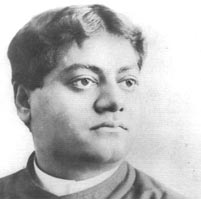
Swami Vivekananda was a Hindu monk and direct disciple of Sri Ramakrishna. Vivekananda played a key role in the introduction of Indian yoga and Vedanta philosophy in the West. He made a strong impression at the inaugural World Parliament of Religions in Chicago, 1893 – giving a powerful speech on the underlying unity of world religions. He taught a philosophy of traditional meditation and also selfless service (karma yoga). He advocated emancipation for Indian women and an end to the worst excess of the caste system. He is considered an important figurehead of India’s growing self-confidence and later nationalist leaders often said they were inspired by his teachings and personality.
“To succeed, you must have tremendous perseverance, tremendous will. “I will drink the ocean”, says the persevering soul; “at my will mountains will crumble up”. Have that sort of energy, that sort of will; work hard, and you will reach the goal.”
– Swami Vivekananda
Swami Vivekananda was born Narendra Nath Datta on 12th January 1863 in Calcutta, Bengal, India.
As a child, the young Narendra had boundless energy, and he was fascinated with many aspects of life – especially wandering ascetics. He received a Western education at the Ishwar Chandra Vidyasagar’s Metropolitan Institution. He became well versed in Western and Eastern philosophy. His teachers remarked he had a prodigious memory and tremendous intellectual capacity.
Shaped by his father’s rationality, Narendra joined the Brahmo Samaj – a modern Hindu organisation, led by Keshab Chandra Sen, which rejected idol worship.
In 1881, Narendra went to Dakshineswar with a friend to meet Sri Ramakrishna – who was widely considered a great saint and spiritual Master.
Narendra felt attracted to the magnetic personality of Sri Ramakrishna and became a regular visitor. At first, his mind could not accept the ways and teachings of Sri Ramakrishna. Ramakrishna followed a simple ‘bhakti’ (devotional) path and he was particularly devoted to Mother Kali (the Divine Mother). But, over time, Narendra’s spiritual experiences in the presence of Ramakrishna caused him to wholeheartedly accept Ramakrishna as his Guru, and he gave up the Brahmo Samaj.
In 1884, Narendra’s father died, leaving the family bankrupt. Narendra became responsible for trying to feed his family, with limited means. He later said he would often go hungry as he could not afford enough food. To the annoyance of his mother, Narendra was often too absorbed in his spiritual disciplines to make earning money a priority.
In 1886, Sri Ramakrishna passed away – just five years after meeting Narendra. Ramakrishna had chosen Narendra to be the leader of the monastic disciples. Vivekananda decided to found a math (monastery) in Belur Math
Swami Vivekananda then threw himself into intense spiritual practices. He would spend many hours in meditation and japa. In 1888, he left the monastery to become a wandering sannyasin, visiting various holy places around India. Vivekananda lived from day to day, begging for food, being immersed in his own spiritual quest. In his Completed Works , he writes of his experience
“Many times I have been in the jaws of death, starving, footsore, and weary; for days and days I had no food, and often could walk no further; I would sink down under a tree, and life would seem to be ebbing away. I could not speak, I could scarcely think, but at last the mind reverted to the idea: “I have no fear nor death; never was I born, never did I die; I never hunger or thirst. I am It! I am It!
He began accepting disciples, and in 1893, accepted an invitation to speak at the World Parliament of Religions in Chicago. He set sail from Bombay in May, sailing first to Japan and then on to the United States. He set sail with little money and few contacts. But, helped by Professor John Wright of Harvard University and others, Vivekananda arrived in Chicago as a representative of the Hindu religion.
World Parliament of Religions
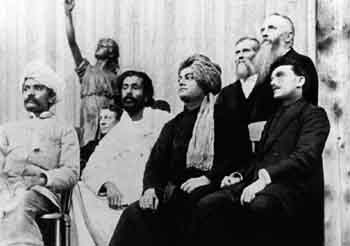
On September 11th, 1893, Vivekananda gave a short speech on the opening day of the conference. After getting up on the stage, Vivekananda bowed to Saraswati (the goddess of learning), then Vivekananda began with the greeting “Sisters and Brothers of America!” – Something in Vivekananda’s address and persona, caused the crowd of seven thousand to stand in ovation for two minutes before he continued his speech.
“It fills my heart with joy unspeakable to rise in response to the warm and cordial welcome which you have given us. I thank you in name of the most ancient order of monks in the world; I thank you in the name of the mother of religions; and I thank you in the name of millions and millions of Hindu people of all classes and sects.”
(see: speech at World Parliament of Religions)
A dominant theme of Vivekananda’s speeches was the universality and harmony of the world religions. The press covering the event frequently stated that Vivekananda was the star performer – captivating the audience with his personality and powerful speeches.
Vivekananda spent two years giving speeches in American and accepting disciples to follow his Vedanta philosophy. In 1894, he founded the Vedanta Society of New York.
In 1895, he travelled to England, where he met Professor Max Muller of Oxford University, and also Margaret Noble (later Sister Nivedita) who would become one of Vivekananda’s closest disciples.
From the US, Vivekananda began an increasing correspondence with his brother disciples of Sri Ramakrishna. He exhorted his fellow sannyasins to throw themselves into social service, helping the poorest to gain an education. This dynamism was a new strand to Indian spirituality – and a break from the older tradition of retreating from the world. Vivekananda wanted his mission to help the world both materially and spiritually.
In 1897, he returned to India to a rapturous welcome. News of his success in the West was greeted with joy and pride in India. Vivekananda was now a well-known figure. Vivekananda spoke passionately about India’s immense spiritual heritage, and also, at the same time, criticised the degeneration of India’s status, due to the caste system, lack of education, subjugation of women and old failed traditions. Vivekananda was a clarion call for India to make progress.
“Come, be men! Kick out the priests who are always against progress, because they would never mend, their hearts would never become big. They are the offspring of centuries of superstition and tyranny. Root out priest-craft first. Come, be men! Come out of your narrow holes and have a look abroad. See how nations are on the march! Do you love man? Do you love your country? Then come, let us struggle for higher and better things; look not back, no, not even if you see the dearest and nearest cry. Look not back, but forward!” – Volume 5, Epistles – First Series, “III Alasinga” (15 May 2010)
Vivekananda created an emerging sense of national pride and national fervour; he was an influential figure in the Indian Renaissance of the late Nineteenth Century. Later Indian leaders, like Netaji, Gandhi, Pal and Tilak would all pay tribute to the inspiration of Vivekananda.
In 1899, Vivekananda returned for another visit to America to continue spreading Vedanta societies. Vivekananda then returned to India and, after failing health, passed away on 4 July 1902.
Citation: Pettinger, Tejvan . “ Biography of Swami Vivekananda ”, Oxford, UK – www.biographyonline.net . Last updated 12th Nov 2017.
Vivekananda – a biography

Vivekananda – a biography by Swami Nikhilananda at Amazon
Highly recommended.
Swami Vivekananda on Himself

Swami Vivekananda on Himself at Amazon
Related pages

- Spiritual figures
- Religious tolerance
- Famous speeches
External pages
- Swami Vivekananda Biography
- Swami Vivekananda at Vivekananda.org
- Speech at World Parliament of Religions
External links
- Swami Vivekananda smokes with an untouchable at Sri Chinmoy Library
- The Sannyasin in America at Sri Chinmoy Library
- February 05, 2019 2:33 AM
- By Itu Mukherjee
In recent times in India, it was Swami Vivekananda alone who preached a great message which is not tied to any do’s and dont’s. Addressing one and all in the nation, he said: In every one of you there is the power of Brahmn (God); the God in the poor desires you to serve Him. This message has roused the heart of the youths in a pervasive way. That is why his message has borne fruit in the service of the nation in diverse ways and in diverse forms of renunciation. His message has, at one end at the same time, imparted dignity and respect to man along with energy and power.
- January 11, 2019 11:12 PM
- By Chakravarthy
Igniting article
- January 07, 2019 3:09 AM
- By Dr. P.K. Yagnik.
This is really an inspiring biography
- December 30, 2018 2:58 PM
- By Sneha jaiswal
Very nice article
- December 21, 2018 11:53 AM
great article sir thanks for sharing this beautyfull article.
- November 16, 2018 12:32 AM
- By simpa singh
Spiritual torch of Humankind. Vivekananda’s teachings had awesome mix of philosophy & Science. Nice post.
- October 18, 2018 7:52 AM
Very inspirational biography of Vivekanand
- October 05, 2018 5:10 AM
- By Rakesh Gupta
a very inspirational man of india would never seen again
- June 29, 2018 10:23 AM
- By dr. y. trilochana
The Indian Guru Who Brought Eastern Spirituality to the West
A new biography explores the life of Vivekananda, a Hindu ascetic who promoted a more inclusive vision of religion
Jennie Rothenberg Gritz
Senior Editor
:focal(700x527:701x528)/https://tf-cmsv2-smithsonianmag-media.s3.amazonaws.com/filer_public/b8/1a/b81a06e8-db67-4546-af24-8f273c7221b4/vadenandaka.jpg)
One morning in September 1893, a 30-year-old Indian man sat on a curb on Chicago’s Dearborn Street wearing an orange turban and a rumpled scarlet robe. He had come to the United States to speak at the Parliament of the World’s Religions , part of the famous World Columbian Exposition . The trouble was, he hadn’t actually been invited. Now he was spending nights in a boxcar and days wandering around a foreign city. Unknown in America, the young Hindu man, named Vivekananda , was a revered spiritual teacher back home. By the time he left Chicago, he had accomplished his mission: to present Indian culture as broader, deeper and more sophisticated than anyone in the U.S. realized.
Every American and European who dabbles in meditation or yoga today owes something to Vivekananda. Before his arrival in Chicago, no Indian guru had enjoyed a global platform quite like a world’s fair . Americans largely saw India as an exotic corner of the British Empire, filled with tigers and idol worshippers. The Parliament of the World’s Religions was meant to be a showcase for Protestantism, particularly mainline groups like Presbyterians, Baptists, Methodists and Episcopalians.
So the audience was astonished when Vivekananda, a representative of the world’s oldest religion, seemed anything but primitive—the highly educated son of an attorney in Calcutta’s high court who spoke elegant English. He presented a paternal, all-inclusive vision of India that made America seem young and provincial.
/https://tf-cmsv2-smithsonianmag-media.s3.amazonaws.com/filer_public/a9/54/a954a671-df9a-400c-94dd-ffcab8d87ab8/swami_vivekananda_at_parliament_of_religions.jpeg)
“I am proud to belong to a religion which has taught the world both tolerance and universal acceptance,” he declared on September 11, 1893. “We believe not only in universal toleration, but we accept all religions as true. I am proud to belong to a nation which has sheltered the persecuted and the refugees of all religions and all nations of the earth. I am proud to tell you that we have gathered in our bosom the purest remnant of the Israelites, who came to Southern India and took refuge with us in the very year in which their holy temple was shattered to pieces by Roman tyranny. I am proud to belong to the religion which has sheltered and is still fostering the remnant of the grand Zoroastrian nation.”
Vivekananda was well-equipped to bridge cultural divides. As a young man named Narendranath Datta, he’d attended Christian schools where he’d been steeped in the Bible and European philosophy. According to one story, his introduction to Indian spirituality came by way of a lecture on English romantic literature. A professor, a Scottish clergyman, mentioned the ecstasies of a nearby guru called Ramakrishna during a discussion of transcendental experiences in William Wordsworth’s poem “ The Excursion .” The students ended up paying Ramakrishna a visit, and Datta went on to embrace Ramakrishna as his guru and adopt a renunciate’s name, Vivekananda, which meant “the bliss of gaining wisdom.”
Now, in Chicago, Vivekananda’s words were warm and inviting, but they were also the words of an activist. That same year, Mohandas Gandhi had arrived in South Africa, where he upended the social order by walking on whites-only paths and refusing to leave first-class railroad cars. Vivekananda likewise wanted to show the world that Indians would no longer be demeaned and defined by European occupiers. He found sympathetic audiences in America, a country that liked to think of itself as anti-colonialist (even as it was on the verge of annexing Hawaii and the Philippines).
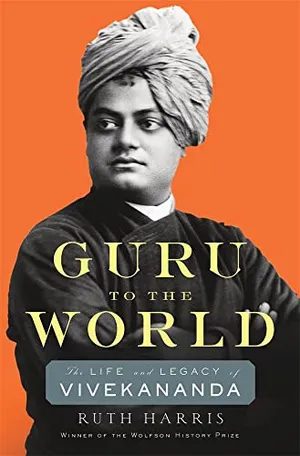
Guru to the World: The Life and Legacy of Vivekananda
From the Wolfson History Prize–winning author of The Man on Devil’s Island , the definitive biography of Vivekananda, the Indian monk who shaped the intellectual and spiritual history of both East and West.
After speaking to the crowd in Chicago, Vivekananda traveled to Detroit, Boston and New York; he met people who’d been exploring new belief systems, including Christian Science . Many of his listeners were women who applauded his message that the divine was present in every human being, transcending gender and social status. Sarah Ellen Waldo, a relative of Ralph Waldo Emerson, later recalled the experience of strolling through Manhattan with Vivekananda by her side: “It required no little courage to walk up Broadway beside that flaming coat. As the Swami strode along in lordly indifference, with me just behind, half out of breath, every eye was turned on us.” Another female enthusiast was invigorated by “the air of freedom that blew through the room” when Vivekananda debated the president of Smith College. The woman’s father disapproved of her interest in the Indian guru, but when a new calf was born to her family, she defiantly named it “Veda” (after the Hindu scriptures of the same name).
Vivekananda spent many of his remaining years traveling around the U.S. and Europe. He died of mysterious causes in 1902, at the age of 39. But generations of Indian gurus who traveled to the West went on to follow his highly successful approach, whether visiting British spiritualist societies or lecturing to middle-aged audiences in Los Angeles living rooms. In the 1960s, the Beatles launched a more youthful wave of interest when they visited India . But the underlying message of teachers from the East has changed little since Vivekananda’s first visit: The individual is cosmic, and meditation and yoga are universal tools for experiencing that underlying reality, compatible with any culture or religion.
Such stories and insights about Vivekananda’s life come alive in Guru to the World , a rich and insightful new biography by Ruth Harris , a historian at the University of Oxford’s All Souls College. Smithsonian spoke to Harris about Vivekananda’s travels through the West and how they gave rise to a kind of Eastern spirituality that most Westerners would recognize today.
/https://tf-cmsv2-smithsonianmag-media.s3.amazonaws.com/filer_public/4b/fa/4bfa1c99-2158-4ef5-ab19-edb902ce7f82/swami_vivekananda-1893-09-signed.jpeg)
Reading your book made me think about my own upbringing. I was raised Jewish and had a bat mitzvah and all, but my parents learned Transcendental Meditation when they were in their 20s, and I grew up in a community where everyone meditated.
That is so Vivekananda. You meditated, but you went to synagogue and you were still Jewish. Vivekananda knew he couldn’t compete with the conventional churches, and at the same time, he also understood that you cannot coerce people to experience God in a way that is not their own.
What was the goal of the Columbian Exposition’s Parliament of the World’s Religions?
The organizers are really thinking that they’re going to export what they call Protestant modernism to the rest of the world. Even though there are tons of Americans evangelizing all over the world, the Protestant organizers want to convey the idea that their version of religion is anti-colonial, that they’ve been doing comparative religion at the University of Chicago and Protestant Christianity just happens to be at the top of the hierarchy. Then this Indian newcomer comes along—this extraordinary Bengali, speaking beautiful English, with an incredible intellect—and he says, “No, that‘s not the case.”
It’s interesting that Vivekananda was much worldlier and more educated than a lot of the people he met in America.
There are moments when he’s in New England when he thinks, “Oh my God, I’m in a very provincial world.” Because he’s used to Calcutta, which is the capital of the Raj, and it’s multicultural, and there are people from all over. He’s used to real diversity. There are Sikhs and Muslims and this and that. But what I think is so remarkable about him is that he doesn’t disdain these provincial Americans. He watches all this stuff they’re doing—mind control, hypnosis—and in his letters he does make fun of them, but in a very kind way. He’s also stunned by them because they are so honest, so open, so interested in learning. He’s never seen anything like it. It’s also the first time in his life he’s in mixed-sex company outside his family.
/https://tf-cmsv2-smithsonianmag-media.s3.amazonaws.com/filer_public/6e/2e/6e2e755d-657f-4ca0-a11e-5cbc98d25e64/1893parliament.jpeg)
How did his arrival fit into the explosion of religions and philosophies that was happening in America around that time?
By the time he arrives, many of the Americans already have a tradition of transcendentalism that they get from [Henry David] Thoreau and all these people. There’s something about what he says that’s kind of familiar. He’s very good. He knows the Bible pretty much by heart. He’s gone to a Scottish missionary school. And they’re stunned by him because he’s so culturally ambidextrous. Whereas they don’t know anything about India, and they think he’s a heathen. He comes back and he says, “I’m no heathen. I have a much more complicated and rarified metaphysical system than you. And also I can argue on your terms.”
So he does. From the beginning, he goes to different churches and he says, “I’m going to throw in another element into this bubbling world of American religion.” Mostly it’s in the Protestant sphere. Every single one of his major devotees has experimented with Christian Science, which is the major new religion founded by Mary Baker Eddy . It’s a woman’s religion; it says we’re going to have healing right now. And mind control and healing become a bridge into yoga.
Did Vivekananda know much about Emerson and Thoreau when he came to Massachusetts?
He certainly knew about Emerson. He knew about Emerson’s idea of the Over-Soul [an immortal, interconnected level of the self]. He’d read all about this in Calcutta. He also knew [Baruch] Spinoza , and he read a lot of Scottish philosophy. It’s not clear how deeply he knew all of this, but it enabled him to say things like, “We have been Spinozists for 2,000 years. You think you started everything; no, we started everything.”
There’s an element of truth in it, but it’s also very defensive. It’s a wounded commentary. Because after all, he’s a colonial subject, and he has to keep on asserting the value of India and Indians against this barrage of Western views of Indians as slothful—perhaps metaphysical, but nihilistic, inactive. He has to produce an image and a persona that counteracts those negative stereotypes.
/https://tf-cmsv2-smithsonianmag-media.s3.amazonaws.com/filer_public/58/0e/580e1376-8f6b-46e7-ac62-c83052bf2dd0/ramakrishna.jpeg)
Vivekananda’s guru, Ramakrishna, came from a poorer, more traditionally religious background, right?
Yes, even though [philosopher] William James and others later quoted Ramakrishna’s sayings, we don’t really know what Ramakrishna actually said, because his ideas were collected by his literate disciples. We get some sense of Ramakrishna as an incredibly charismatic, illiterate man who refuses education for many reasons, mostly because he thinks that books get in the way of true spirituality. But in Vivekananda, he picks a disciple who is the ultimate opposite.
Did Vivekananda see himself as promoting the Hindu religion?
If you go through what he talks about during the world parliament in 1893, he never talks about Hindu gods because he’s so afraid of being accused of idolatry. What he says is that even in India, people who bow down to statues have a vision of the ultimate [level of existence] behind it, and that you should stop making fun of them and being contemptuous. He emphasizes this idea that there is an ultimate cosmic unity, and you reach that through a series of disciplines and relationships and learning.
He saw Indian spirituality as an anti-colonial weapon—the goal was to make Westerners milder and more thoughtful and less brutal and less rigid. It was a gift that he wanted to bring, what he saw as a superior spirituality, because Westerners were materialistic. They didn’t know how to reach higher states of consciousness.
It doesn’t sound like God was the main thing he cared about.
That’s right. He says, “I’m not here to convert.” They find that astonishing. Though what’s interesting is when he goes to Rome, he loves the saints’ cults and the glitter and the baroque and everything. So the women ask him, “But how can you like this?” He just does his Vivekananda thing. He looks at them and says, “If you’re going to have a personal God, give it your all.” What he’s trying to say is, "I’m here in Rome."
When in Rome …
Exactly. And also he’s trying to say, “West, come and do that with us.” When he first comes to New England, he says, “I know you think that you don’t have any images, but when you pray, don’t you envisage the cross?” And they’d never thought of that. Also, he believes that Jesus is an avatar , a god-man.
/https://tf-cmsv2-smithsonianmag-media.s3.amazonaws.com/filer_public/62/e6/62e6b4fb-e0b1-41d7-9869-5583ef221d33/swami_vivekananda_at_mead_sisters_house_south_pasadena.jpeg)
But above that is advaita , the unity which is formless. The reason he prioritizes the formless is because the rest of it is all symbolic. Whereas the formless—the reason why he thinks that’s so great is, you don’t fight over whether you take the Eucharist. So you’re quite right, he doesn’t talk about the Hindu gods. But when he has close devotees, he starts to talk about them.
You write about how a lot of his followers were women.
Yes, and when the women are alone with him, he chants and he cooks for them, and he has a kind of warmth and femininity and maternal qualities that they find really entrancing. They’ve never had a man cook for them before.
There’s a passage where you describe Vivekananda talking about the tradition of suttee , where a widow was expected to throw herself on her husband’s funeral pyre. He said, essentially, that if it was really their choice, they should be allowed to do it.
Vivekananda was not in favor of suttee, though his mentioning of “consent” by these women suggests that he was defensive about Western criticism of what was considered Hindu “barbarism.” I have to say, his disciple Margaret Noble, who was known as Nivedita , was much more into it than he was. She romanticized the idea of the sacrifice, especially for love and union—but I don’t think she would have liked the reality. The notion of sacrifice became very important to militant nationalism, hence her emphasis on it. This is an aspect of Hinduism that is just very hard for us to understand.
How is it different from the way we talk about sacrifice in Western religions?
In the monotheistic religions, we understand the sacrificial, too—the Abrahamic possible sacrifice of Isaac and of course Jesus’ sacrifice. But that’s not quite the same thing as the Indian idea. For instance, people think Gandhi was just like a Quaker. He was not. He believed that you should lay down your life. Your life was the only thing you had to give. The rest of what you possessed was nothing. That’s a very radical idea.
/https://tf-cmsv2-smithsonianmag-media.s3.amazonaws.com/filer_public/64/cc/64cca159-87af-4a14-a070-c3effc3379f8/blessings_to_nivedita.jpeg)
What Vivekananda really didn’t like about Christianity was the notion of duty, because he thought it meant that you were constantly berating yourself. There’s a notion of Hindu dharma that is sometimes translated as “duty,” but it really has no equivalent in English. Dharma is different for different castes. It’s different for different groups. Duty is something you do for God, or to earn a place in heaven. Whereas dharma isn’t something you do to please God. It’s for yourself. The whole ethical system is altered by that.
The caste system is a topic where, even now, a lot of spiritually minded Westerners will come across a mention of it in the Bhagavad-Gita [a 700-verse dialogue about the nature of reality that is one of the core Hindu texts] and think, “I’ll pretend I didn’t see that.”
For the Indians, there was the difficulty of trying to translate. But on the other side, there’s the postmodernist American Western view that we can pick and choose, and the integrity of all these religious systems goes out the window. Then spirituality becomes a form of consumerism.
Integrity is a good word for it, but where did Vivekananda draw the line? Does integrity mean you have to accept the notion that some people are born into a lower caste and that’s just where they have to stay?
That’s what’s so moving about him. He’s constantly grappling with that himself. He hates child marriage. He doesn’t want suttee anymore; he thinks it’s terrible. He doesn’t reject caste, but he thinks you can become a caste—that people can move and recreate themselves. Yet at the same time, he fights and fights and fights with his own conscience, and with the pace of change, and what can be done in India, and what can be done in the West.
That’s what’s so hard. If you’re a guru, you’re meant to be spiritual all the time. So what do you do with all these things that are embarrassing, fear-creating, disturbing? And how do you actually examine your own culture? Are you locked into an essentialist notion, that you’re spiritual and the West is material, or you’re intuitive and the West is rational? The “East” is a geographical imaginary anyway, isn’t it? But for many of us in Europe and America, the spirituality of our grandparents’ generation no longer feels suitable for us. So we like this idea of “going to the East,” in a way where we can pick and choose.
/https://tf-cmsv2-smithsonianmag-media.s3.amazonaws.com/filer_public/2e/8f/2e8fca43-2c68-4829-a7ef-c097d3834099/gettyimages-845719664.jpg)
The way you talk about Vivekananda makes me think of other teachers from very old traditions who want to make their messages universal. The Dalai Lama can talk in such a relatable way but, at the same time, he’s the head of an actual religious group with its own rituals and beliefs.
One of the things I argue in the book is that Vivekananda was constantly ill, and we don’t know why he was so ill. You don’t want to have retrospective diagnoses and do any of that. But there is something about the strain of constantly operating on other people’s terms. He did it, but it was exhausting and very depleting—constantly being on your toes to convince people of what might be useful to them, and at the same time trying to gauge what they might be able to accept and what they might not be able to accept.
But on some level—I mean I’m joking, but honestly, we’re all Hindus now. You’re an example of how successful that was. I was at a seminar in Oxford where they were doing all this “ JewBu ” stuff, with Buddhism in synagogues. This is why the issue of appropriation is so complex. Because Vivekananda was really glad that Westerners were appropriating his teachings. He didn’t like the cherry-picking, but he liked different kinds of synthesis. So it’s very tricky, isn’t it?
You write about how today’s Hindu nationalists embrace Vivekananda even though his ideology was actually really different from theirs.
It’s not that you won’t find statements from Vivekananda that seem to assert Hindu superiority. But what I find amazing, when you see the Indian Prime Minister Narendra Modi and his nationalistic embrace of Vivekananda, is that you also have so many Indians who were communists, socialists—and they get it from Vivekananda.
Vivekananda died so young, but you could see his views changing with time. We are all provisional.
How did your views change during the decade you were working on this book?
I spent three or four years in turmoil because I couldn’t understand Vivekananda’s world. That’s when I started to listen to the Bhagavad-Gita, and I found Indian friends who were willing to talk to me. Now I still don’t know much, but at least I feel I’ve scratched the surface.
Above all, I realized I wasn’t afraid to actually put my cards on the table and say that what’s important in this history is spiritual love affairs. This is a book about love—the love between Vivekananda and Ramakrishna, and the love between Vivekananda and his followers in the West. Vivekananda would constantly say that devotion to the guru should not be personal. It expresses itself in personal ways, but the guru is a channel to the divine. But you just have to accept that without the love that goes on between these people, none of it is comprehensible.
Get the latest History stories in your inbox?
Click to visit our Privacy Statement .
A Note to our Readers Smithsonian magazine participates in affiliate link advertising programs. If you purchase an item through these links, we receive a commission.
Jennie Rothenberg Gritz | READ MORE
Jennie Rothenberg Gritz is a senior editor at Smithsonian magazine. She was previously a senior editor at the Atlantic .

Ramakrishna-Vivekananda Center of New York
A vedanta temple for universal worship.
Ramakrishna Order
Sri Ramakrishna
Holy Mother
Swami Vivekananda
Vivekananda in America
Parliament Addresses
Swami Vivekananda Image Album
Swami Yuktatmananda
Swami Adiswarananda
Swami Nikhilananda
Universal Teachings

(1863-1902)
Swami Vivekananda's inspiring personality was well known both in India and in America during the last decade of the nineteenth century and the first decade of the twentieth. The unknown monk of India suddenly leapt into fame at the Parliament of Religions held in Chicago in 1893, at which he represented Hinduism. His vast knowledge of Eastern and Western culture as well as his deep spiritual insight, fervid eloquence, brilliant conversation, broad human sympathy, colourful personality, and handsome figure made an irresistible appeal to the many types of Americans who came in contact with him. People who saw or heard Vivekananda even once still cherish his memory after a lapse of more than half a century.
In America Vivekananda's mission was the interpretation of India's spiritual culture, especially in its Vedantic setting. He also tried to enrich the religious consciousness of the Americans through the rational and humanistic teachings of the Vedanta philosophy. In America he became India's spiritual ambassador and pleaded eloquently for better understanding between India and the New World in order to create a healthy synthesis of East and West, of religion and science.
In his own motherland Vivekananda is regarded as the patriot saint of modern India and an inspirer of her dormant national consciousness, To the Hindus he preached the ideal of a strength-giving and man-making religion. Service to man as the visible manifestation of the Godhead was the special form of worship he advocated for the Indians, devoted as they were to the rituals and myths of their ancient faith. Many political leaders of India have publicly acknowledged their indebtedness to Swami Vivekananda.
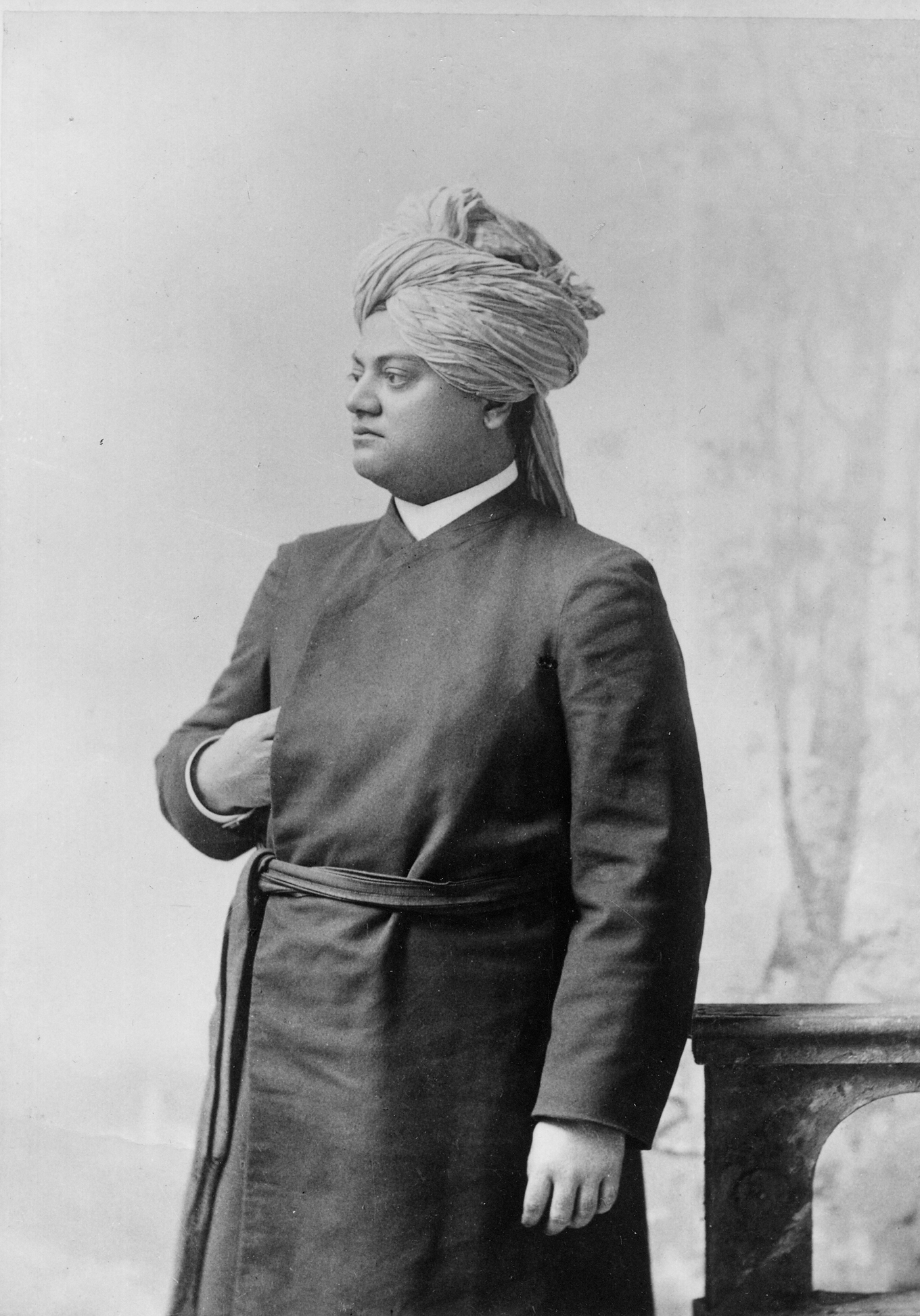
The Swami's mission was both national and international. A lover of mankind, he strove to promote peace and human brotherhood on the spiritual foundation of the Vedantic Oneness of existence. A mystic of the highest order, Vivekananda had a direct and intuitive experience of Reality. He derived his ideas from that unfailing source of wisdom and often presented them in the soulstirring language of poetry.
The natural tendency of Vivekananda's mind, like that of his Master, Ramakrishna, was to soar above the world and forget itself in contemplation of the Absolute. But another part of his personality bled at the sight of human suffering in East and West alike. It might appear that his mind seldom found a point of rest in its oscillation between contemplation of God and service to man. Be that as it may, he chose, in obedience to a higher call, service to man as his mission on earth; and this choice has endeared him to people in the West, Americans in particular.
In the course of a short life of thirty-nine years (1863-1902), of which only ten were devoted to public activities-and those, too, in the midst of acute physical suffering-he left for posterity his four classics: Jnana-Yoga, Bhakti-Yoga, Karma-Yoga, and Raja-Yoga, all of which are outstanding treatises on Hindu philosophy. In addition, he delivered innumerable lectures, wrote inspired letters in his own hand to his many friends and disciples, composed numerous poems, and acted as spiritual guide to the many seekers, who came to him for instruction. He also organized the Ramakrishna Order of monks, which is the most outstanding religious organization of modern India. It is devoted to the propagation of the Hindu spiritual culture not only in the Swami's native land, but also in America and in other parts of the world.
Swami Vivekananda once spoke of himself as a "condensed India." His life and teachings are of inestimable value to the West for an understanding of the mind of Asia. William James, the Harvard philosopher, called the Swami the "paragon of Vedantists." Max Muller and Paul Deussen, the famous Orientalists of the nineteenth century, held him in genuine respect and affection. "His words," writes Romain Rolland, "are great music, phrases in the style of Beethoven, stirring rhythms like the march of Handel choruses. I cannot touch these sayings of his, scattered as they are through the pages of books, at thirty years' distance, without receiving a thrill through my body like an electric shock. And what shocks, what transports, must have been produced when in burning words they issued from the lips of the hero!''
Ramakrishna-Vivekananda Center, New York
January 5, 1953, back to top.

Swami Vivekananda
A short biography.
Swami Vivekananda (1863-1902) was the foremost disciple of Sri Ramakrishna and a world spokesperson for Vedanta. His lectures, letters and poems are published as The Complete Works of Swami Vivekananda . Swamiji, as Vivekananda is affectionately known, believed it was best to teach universal principles rather than personalities. Therefore, his teaching and writing focus on Vedanta philosophy and not Sri Ramakrishna.
Vivekananda represented Hinduism at the 1893 World’s Parliament of Religions convened during the World’s Columbian Exposition in Chicago. With his opening words, “Sisters and brothers of America”, Swamiji brought the crowd to its feet. Subsequently he was invited to speak all over America and Europe. In fact, most Vedanta Societies which were founded in America and Europe up through the 1930s can trace their origins directly to Vivekananda or the people who heard him speak from 1893 through 1900.
After his first visit to the West, Swami Vivekananda went back to India and founded the Ramakrishna Order at Belur outside of Kolkata in 1898. When he returned to the United States a few years later, he was accompanied by his brother monk Swami Turiyananda. Other brother disciples of Sri Ramrakrishna, Swamis Saradananda and Abhedananda, followed Swamiji and taught widely.
Vivekananda was a man with a great spiritual presence and tremendous intellect who was a tireless teacher and writer. He wrote poems and hymns in Bengali, English and Sanskrit, some of which are sung daily in Vedanta centers worldwide. He was ahead of his time in encouraging women and Westerners to not only practice Vedanta, but to be leaders. Two examples are Sara Ellen Waldo who recorded and collected Swamiji’s talks at Thousand Island Park and Margaret Noble, later known as Sister Nivedita, who devoted her life not only to Vedanta but also to the education of Indian girls. The Master as I Saw Him is her account of the years she knew Swamiji. Vivekananda initiated both women as a sannyasini and brahmacharini respectively, a radical act for the time.
Vivekananda’s main teaching in the West, and in India for that matter, is Practical Vedanta. By this the Swami stressed that religion needs to be intensely practical and carried into all areas of our lives. The primary message of Vedanta is one of oneness and that our human purpose is to realize our divine nature. Through his teachings on the four yogas, the harmony of religions, divinity of the soul, and serving humanity as God, Vivekananda gave spiritual aspirants paths to that realization. The Swami also made major contributions to both world culture and Indian culture.
Comprehensive biographies of Swamiji include Vivekananda: a Biography by Swami Nikhilananda and The Life of Swami Vivekananda by his Eastern and Western disciples, and the 6 volume Swami Vivekananda in the West: New Discoveries by Marie Louise Burke.
Power and Repose—
A reminiscence of swami vivekananda.

Swami Vivekananda’s
Southern california visit.

Key Works Of Swami Vivekananda
- The Complete Works of Swami Vivekananda
- Swami Vivekananda’s Speeches at the Parliament of Religions, Chicago, 1893
- Letters of Swami Vivekananda
- Jnana Yoga: The Yoga of Knowledge
- Bhakti Yoga: The Yoga of Love and Devotion
- Karma Yoga: The Yoga of Action
- Raja Yoga: The Yoga of Meditation
Key Works On Swami Vivekananda
- Vivekananda A Biography, by Swami Nikhilananda
- Swami Vivekananda by Eastern and Western Disciples
- The Master As I Saw Him, by Sister Nivedita
- Reminiscences of Swami Vivekananda
- The Life of Vivekananda, by Romain Rolland
Quotes From Swami Vivekananda
“Religion is not in books, nor in theories, nor in dogmas, nor in talking, not even in reasoning. It is being and becoming.”
“Infinite power and existence and blessedness are ours, and we have not to acquire them; they are our own, and we have only to manifest them.”
“Be an atheist if you want, but do not believe in anything unquestioningly.”
“You have to grow from the inside out. None can teach you, none can make you spiritual. There is no other teacher but your own soul.”
“I do not believe in a God or religion which cannot wipe the widow’s tears or bring a piece of bread to the orphan’s mouth.”
“This life is short, the vanities of the world are transient, but they alone live who live for others, the rest are more dead than alive.”
“Take up one idea. Make that one idea your life – think of it, dream of it, live on that idea. Let the brain, muscles, nerves, every part of your body, be full of that idea, and just leave every other idea alone. This is the way to success.”
“In judging others we always judge them by our own ideals. That is not as it should be. Everyone must be judged according to his own ideal, and not by that of anyone else.”
“He who has no faith in himself can never have faith in God.”
“The first sign that you are becoming religious is that you are becoming cheerful. When a man is gloomy, that may be dyspepsia, but it is not religion.”
“The living God is within you.”
“Manifest the divinity within you and everything will be harmoniously arranged around it.”
“After so much austerity I have known that the highest truth is this: He is present in every being! These are all in manifold forms of him. There is no other God to seek for! He alone is worshipping God, who serves all beings!”
What Others Said About Him
“I have gone through Swami Vivekananda’s works very thoroughly, and after having gone through them, the love that I had for my country became a thousand-fold. …His writings need no introduction from anybody. They make their own irresistible appeal.” —Mahatma Gandhi
“Where can you find a man like him? Study what he wrote, and learn from his teachings, for if you do, you will gain immense strength. Take advantage of the fountain of wisdom, of Spirit, and of fire that flowed through Vivekananda.” —Jawaharlal Nehru
“I had the special privilege of being introduced to the writings, sayings, and life of Swami Vivekananda and the Ramakrishna Mission. That was when I was very small. In fact both my parents and specially my mother had very close connections with the Mission. And I can truly say that the words of Swami Vivekananda inspired the whole of my family, in our political work as well as in our daily lives.” —Indira Gandhi
“The book by Vivekananda is more than a pleasure, it is a broadening of the soul.” —Leo Tolstoy
“The paragon of all Unity systems is the Vedanta philosophy of India, and the paragon of Vedanta missionaries was the late Swami Vivekananda. The man is simply a wonder for oratorical power. …The swami is an honor to humanity.” —William James
“The qualities I most admire in Vivekananda are his activity, manliness and courage. …He spoke up and acted. For this, all must honor him, who, whatever be their won religious beliefs, value sincerity, truth and courage, which are the badges of every noble character.” —Sir John Woodroffe
“It is very difficult to evaluated his [Swami Vivekananda’s] importance in the scale of world history. It is certainly far greater than any Western historian or most Indian historians would have suggested at the time of his death. The passing of the years and the many stupendous and unexpected events which have occurred since then suggest that in centuries toi come he will be remembered as one of the main molders of the modern world, especially as far as Asia is concerned, and as one of the most significant figures in the whole history of Indian religion.” —A.L. Basham
“One of the very greatest historical figures that India has ever produced.” —Christopher Isherwood
Also read about:
Sri Ramakrishna
Sri Sarada Devi
Home -> Our Teachers -> Swami Vivekananda
Error: Contact form not found.
- Bihar Board
CFA Institute
Srm university.
- Rajasthan 10th Result
- Rajasthan Board Result
- Shiv Khera Special
- Education News
- Web Stories
- Current Affairs
- School & Boards
- College Admission
- Govt Jobs Alert & Prep
- GK & Aptitude
- general knowledge
Swami Vivekananda Biography: Early Life, Education, Works, Teachings and Famous Quotes
National youth day 2024: it is celebrated on 12 january to commemorate the birth anniversary of swami vivekananda. he was a great thinker, a great orator, and a passionate patriot. on national youth day, read more about swami vivekananda's early life, education, works, teachings, philosophy books, etc. .

National Youth Day 2024: It is celebrated on 12 January to honor the birth anniversary of Swami Vivekananda. Swami Vivekananda is a name that does not require any sort of introduction. He is an influential personality who is credited with enlightening the western world about Hinduism. He represented Hinduism in the Parliament of Religions in 1893 in Chicago and due to this an unknown monk of India suddenly leaped into fame. National Youth Day is observed on 12 January to commemorate the birth anniversary of Swami Vivekananda.
Swami Vivekananda founded Ramakrishna Mission on 1 May 1897 for one's own salvation and for the welfare of the world. Do you know his lectures, writings, letters, and poems are published as The Complete Works of Swami Vivekananda? He always focuses on teaching universal principles rather than personalities. He had tremendous intellect. His unique contributions always enlighten and awaken us. He was a spiritual leader and social reformer.
"All the powers in the universe are already our. It is we who have put our hands before our eyes and cry that it is dark."- Swami Vivekananda
If anyone wants to study the origin of the Vedanta movement in America then study Swami Vivekananda travels across the US. He was a great thinker, great orator, and passionate patriot. It is not wrong to say that he was more than just a spiritual mind.
READ| National Youth Day 2024: Date, Theme, History, Significance, Celebrations on Rashtriya Yuva Diwas
Born: 12 January, 1863
Place of Birth: Kolkata, India
Childhood Name: Narendranath Dutta
Father: Vishwanath Dutta
Mother: Bhuvaneshwari Devi
Education: Calcutta Metropolitan School; Presidency College, Calcutta
Religion: Hinduism
Guru: Ramakrishna
Founder of : Ramakrishna Mission (1897), Ramakrishna Math, Vedanta Society of New York
Philosophy: Advaita Vedanta
Literary works: Raja Yoga (1896), Karma Yoga (1896), Bhakti Yoga (1896), Jnana Yoga, My Master (1901), Lectures from Colombo to Almora (1897)
Death: 4 July, 1902
Place of Death: Belur Math, Belur, Bengal
Memorial: Belur Math. Belur, West Bengal
Swami Vivekananda was born on 12 January 1863, in Kolkata (earlier Calcutta). He was a spiritual leader and social reformer. His lectures, writings, letters, poems, and ideas motivated not only the youth of India but also the whole world. He is the founder of Ramakrishna Mission and Belur Math in Calcutta, which are still working towards helping the needy. He was a man of wisdom and a very simple human being.
"Arise, awake and stop not until the goal is achieved" - Swami Vivekananda
READ| Top 51+ Swami Vivekananda Quotes for Inspiration and Motivation
Swami Vivekananda: Life History and Education

Source: www. medium.com
Vivekananda's childhood name was Narendranath Dutta, belonged to an affluent Bengali family in Calcutta. He was one of the eight children of Vishwanath Dutta and Bhuvneshwari Devi. On the occasion of Makar Sankranti, he was born on 12 January 1863 . His father was an attorney and an influential personality in society. Vivekananda's mother was a woman who has faith in God and has a great impact on his son.
At the age of eight in 1871, Vivekananda was enrolled at Ishwar Chandra Vidyasagar's Institution and later at the Presidency College in Calcutta. He was exposed to Western philosophy, Christianity, and science. He had an interest in music both instrumental as well as vocal. He was active in sports, gymnastics, wrestling, and bodybuilding. He was also fond of reading and by the time he had completed his graduation from college, he had acquired a vast knowledge of various subjects. Do you know on the one hand he read Hindu scriptures like Bhagavad Gita and the Upanishads and on the other hand western philosophies and spirituality by David Hume, Herbert Spencer, etc?
“Be an atheist if you want, but do not believe in anything unquestioningly.”- Swami Vivekananda
READ| Why is Swami Vivekananda's birthday celebrated as National Youth Day?
Spiritual Crisis and met with Ramakrishna Paramhansa

Source: www. swamishivapadananda.typepad.com
He had grown up in a religious family but studied several religious books and his knowledge led him to question the existence of God and sometimes he believed in Agnosticism. But he could not completely deny the fact about the supremacy of God. In 1880 , he joined Keshab Chandra Sen's Nava Vidhan and also became a member of Sadharan Brahmo Samaj led by Keshab Chandra Sen and Debendranath Tagore.
Brahmo Samaj recognized one God, unlike idol worship. Several questions were running through the mind of Vivekananda and during his spiritual crisis, he first heard about Shri Ramakrishna from William Hastie, the Principal of the Scottish Church College. He finally met Shri Ramakrishna Paramhansa at Dakshineshwar Kali Temple and Vivekananda asked him a question, "Have you seen God?" which he had asked so many spiritual leaders but was not satisfied. But when he asked Ramakrishna, he gave such a simple answer that "Yes, I have. I see God as clearly as I see you, only in a much deeper sense". After this Vivekananda started visiting Dakshineshwar and got several answers to the questions that were in his mind.
When Vivekananda's father died, the whole family faced a financial crisis. He went to Ramakrishna and asked him to pray for his family but Ramakrishna refused and told Vivekananda to pray himself in front of Goddess Kali. He could not ask for wealth, or money but instead of it, he asked for conscience and reclusion. That day he was marked with a spiritual awakening and a way of ascetic life was started. This was the turning point in his life and accepted Ramakrishna as his Guru.
“Take risks in your life. If you win, you can lead, if you lose, you can guide.” Swami Vivekananda
In 1885 , Ramakrishna developed throat cancer and was transferred to Calcutta and then later to a garden house in Cossipore. Vivekananda and other disciples of Ramakrishna took care of him. On 16 August 1886 , Shri Ramakrishna gave up his mortal body. Narendra was taught that the service to men was the most effective worship of God. After the demise of Ramakrishna, fifteen of his disciples including Narendranath began to live together at Baranagar in North Calcutta, which was named Ramakrishna Math . In 1887 , all the disciples took vows of monkhood and Narendranath emerged as Vivekananda which is "the bliss of discerning wisdom." All of them performed yoga and meditation. Further, Vivekananda left the math and decided to tour the whole of India on foot which came to be known as 'Parivrajak'. He saw several social, cultural, and religious aspects of the people and also saw what common people faced in their daily life, their sufferings, etc.
Swami Vivekananda attended the World Parliament of Religions

When he came to know about the World Parliament that was organised in Chicago, America. He was keen to attend the meeting, to represent India and his Guru's philosophies. After various troubles, he attended the Religious meeting. On 11 September, 1893 , he came upon the stage and stunned everyone while saying "My brothers and sisters of America". For this, he received a standing ovation from the audience. He described the principles of Vedanta, their spiritual significance, etc. He stayed around two and a half years in America itself and founded the Vedanta Society of New York. He also travelled to the United Kingdom to preach the philosophies, spiritualism, and principles of Vedanta.
“Learn everything that is good from others but bring it in, and in your own way absorb it; do not become others.” Swami Vivekananda
READ| Ramakrishna Mission and Vivekananda: Contribution to Social Reform
He founded Ramakrishna Mission
Around 1897 , he returned to India and reached Calcutta where he founded Ramakrishna Mission on 1 May 1897 at Belur Math. The goals of the mission were based on Karma Yoga and its main objective was to serve the poor and suffering or disturbed population of the country. Several social services are also performed under this mission like establishing schools, colleges, and hospitals. Teachings of Vedanta were also provided through conferences, seminars, and workshops, rehabilitation work across the country.
Let us tell you that Vivekananda's teachings were mostly based on Ramakrishna's spiritual teachings of Divine manifestations and his personal internalization of the Advaita Vedanta Philosophy. According to him, the ultimate goal of life is to achieve the freedom of the soul and that encompasses the entirety of one's religion.
He predicted that he will not live till the age of 40. Therefore, on 4 July 1902, he died while doing meditation. He is said to have attained 'Mahasamadhi' and was cremated on the Banks of the river Ganga.
“A man is not poor without a rupee but a man is really poor without a dream and ambition.” Swami Vivekananda
Key Works of Swami Vivekananda
- The Complete Works of Swami Vivekananda
- Swami Vivekananda’s Speeches at the Parliament of Religions, Chicago, 1893
- Letters of Swami Vivekananda
- Jnana Yoga: The Yoga of Knowledge
- Yoga: The Yoga of Love and Devotion
- Yoga: The Yoga of Action
- Raja Yoga: The Yoga of Meditation
Key Works on Swami Vivekananda
- Vivekananda A Biography, by Swami Nikhilananda
- Swami Vivekananda by Eastern and Western Disciples
- The Master As I Saw Him, by Sister Nivedita
- Reminiscences of Swami Vivekananda
- The Life of Vivekananda, by Romain Rolland
No doubt Swami Vivekananda's teachings not only motivated the youth but also the whole world. He laid the true foundations of India's unity as a nation. He taught us how to live together with so many diversities. He was successful in constructing a virtual bridge between the culture of the East and the West. He played a key role in isolating India's culture from the rest of the World.
“Take up one idea, make that one idea your life, think of it, dream of it, let the brain, muscles, nerves, every part of your body be full of that idea, and just leave every other idea alone. This is the way to success.” Swami Vivekananda
Get here current GK and GK quiz questions in English and Hindi for India , World, Sports and Competitive exam preparation. Download the Jagran Josh Current Affairs App .
- What are the key works of Swami Vivekananda? + Swami Vivekananda's key works are - The Complete Works of Swami Vivekananda, - Swami Vivekananda’s Speeches at the Parliament of Religions, Chicago, 1893 - Letters of Swami Vivekananda - Jnana Yoga: The Yoga of Knowledge - Yoga: The Yoga of Love and Devotion, etc.
- What is the childhood name of Swami Vivekananda? + Swami Vivekananda was an inspiring personality and was famous in the whole world. He was born on 12 January 1863, in Calcutta (now Kolkata). His childhood name was Narendranath Dutta, belonged to an affluent Bengali family in Calcutta (now Kolkata). He was one of the eight children of Vishwanath Dutta and Bhuvneshwari Devi.
- What is Swami Vivekananda known for? + Swami Vivekananda is best known for his groundbreaking speech to the 1893 World's Parliament of Religions in which he introduced Hinduism to America and called for religious tolerance.
- When is National Youth Day celebrated and why? + National Youth Day is celebrated on 12 January to honour the birth anniversary of Swami Vivekananda.
- Who founded the Ramakrishna Mission? + Ramakrishna Mission was founded by Swami Vivekananda in 1897 with two-fold purpose namely to spread the teachings of Vedanta as embodied in the life of the Hindu saint Ramakrishna and to improve the social conditions of the Indian people.
- When was Swami Vivekananda born? + Swami Vivekananda was born on 12 January 1863 in Kolkata, India.
- KKR vs SRH IPL Final 2024
- IPL 2024 Final
- T20 World Cup Teams and Sqauds
- India T20 World Cup Squad 2024
- IPL Winners List
- IPL 2024 Points Table
- Memorial Day 2024
- Orange Cap in IPL 2024
- RBSE 10th Result 2024
- Rajasthan Board Result 2024
- Personalities of India
- History Facts
Latest Education News
IISER IAT Admit Card 2024 Out, Download at iiseradmission.in
You have hunter eyes if you can spot the hidden antelope in 6 seconds!
JEE Advanced Provisional Answer Key 2024 Tomorrow, Download At jeeadv.ac.in
Only the sharpest eyes can find 3 differences between the playing card pictures in 12 seconds!
India T20 World Cup 2024 Squad: ये है रोहित की ‘विराट’ टीम, किस रोल में कौन? देखें यहां
Lok Sabha Election 2024 Polling Booth: घर बैठे कैसे पता करें अपना मतदान केंद्र?
Pakistan T20 World Cup Squad 2024: पाक की विश्व कप टीम में किसे मिला मौका कौन हुआ बाहर देखें यहां
T20 World Cup 2024 Match Time in India: अमेरिका में मैच का है यह टाइम तो भारत में किस समय देखें
[रोल नंबर] Rajasthan Board Class 8th 5th Result 2024 Roll Number: 5वीं में 97.60% और 8वीं में 95.72% छात्र सफल, Marksheet यहां से करें डाउनलोड
Lok Sabha Election Results 2024: Exit Polls Date and Time, Where to Watch Live Streaming
T20 World Cup 2024 Commentators List: हिंदी कमेंट्री पैनल में शामिल है ये भारतीय दिग्गज, देखें पूरी सूची
भारत के कौन-से नेता मुख्यमंत्री या मंत्री रहे बिना सीधे बने प्रधानमंत्री?
DL New Rules 2024: RTO गए बिना ड्राइविंग टेस्ट कैसे करें पास? जानें यहां
ICC T20 World Cup 2024: T20 वर्ल्ड कप का शेड्यूल जारी, कब और किससे है India का Match देखें यहां
[नतीजे घोषित] RBSE Class 5th 8th Result 2024: 5वीं 8वीं के परिणाम जारी, rajshaladarpan.nic.in पर देखें Marksheet, निजी स्कूलों का बेहतर प्रदर्शन
Genius IQ Test: Find the value of the triangle in 11 seconds!
I Lost My Penny. Can You Spot The Lost Coin Hidden On The Floor Within 7 Seconds?
Academic Excellence, Flexibility and Diversity Make US A Top Destination Among International Students
Brain Teaser IQ Test: Find the mistake in the couple picture in 3 seconds!
Why RBI is Pulling Back 100 Tonnes of Gold from UK? Know What does this Mean
Talk to our experts
1800-120-456-456
- Swami Vivekananda Biography

Biography of Swami Vivekananda
To tell the tale of a great leader, Vedantu is bestowing students with Swami Vivekananda Biography - About, Background, History, and Death article. The biography could be found on Vedantu's website. It is totally free of cost and doesn’t require any prior signups and registration fee. Furthermore, the content could be downloaded in PDF format. The PDF is accessible on all types of digital devices like phone, laptop or tablet. The students should not miss the opportunity and actively use the opportunity to learn about Swami Vivekananda and his life for free. Download and read now!
Vivekananda
Vivekananda who was also referred to as Swami Vivekananda was originally named Narendranath Datta. He was influenced by both Indian and western culture. His exposure to Hindus deity form of worship and Christian religion often conflicted with his beliefs. This was until he accepted Ramakrishna as his guru and became a monk. His vast knowledge of culture also earned him the respect and recognition of raising interfaith awareness. He believed through his learnings from his guru that service to God can be displayed by service to humankind.
About Swami Vivekananda
Swami Vivekananda born as Narendranath Datta to father Vishwanath Datta and mother Bhubaneswari Devi on 12 January 1863, in Calcutta presently known as Kolkata, India. When he was later regarded as a patriotic saint, Swami Vivekananda Birthday is celebrated as National Youth Day. His grandfather was a Sanskrit and Persian Scholar, his father was an attorney in the high court and his mother was a homemaker and had a religious temperament. Swami Vivekananda grew up in an upper-middle-class-family. His personality and attitude were shaped by both his parents progressive, rational as well as religious approaches in life. Since his childhood, he was always interested in spirituality and meditated and prayed before the Hindu Deities.
Swami Vivekananda Background
Swami Vivekananda had a fascinating journey with his foray into spirituality. He was an excellent student. He studied anything that interests him, be it philosophy, science, history, religion or literature. He also was an avid reader of all kinds of religious texts like the Bhagavad Gita, Ramayana, Mahabharata, Upanishads, and the Vedas.
At 10 when his family moved back to his birthplace after living in Raipur for 2 years he gave an entrance exam for Presidency College. He was the only student who secured 1st division marks. He was an allrounder, who was also trained in Indian classical music, and very actively participated in sports and organized events as we. His intelligence was not just in books but applied in real life and this showed when he traveled abroad. He never dismissed the western way of materialistic life rather infused his knowledge of the western world into traditional teachings.
Due to his belief in western philosophy, he rebelled against the caste differences practiced and ingrained deeply in the Asian culture. Swami Vivekananda also joined Brahmo Samaj in 1884 which is a society founded in 1828 that adopted Christian practices and this allowed him to venture into social reform. He was determined to challenge the ideas of society by spreading the importance of education among women and the lower caste and eliminating illiteracy and child marriage. He was also actively working from 1881-1884 with Band Of Hope that helped youth step into the light and stay away from harmful habits like smoking and drinking.
During this period in his early 20’s, he first met Ramakrishna in He detested the practices of Ramakrishna who prayed before the deity of a Hindu Goddess, Kaali. He always questioned the forms of God and due to his western influence argued God to be a formless being. It was in 1884 when his father suddenly died and he suddenly faced the harsh realities when he learnt he had to repay many debts his father had. During this time his visits to Ramakrishna became more frequent and he actually understood his belief system that demonstrated unity in all religions. At 25 Swami Vivekananda renounced all worldly possessions to truly realize God. He became the leader after the death of his Guru in 1886.
Swami Vivekananda History
After the death of his guru, the trustees withdrew funding and many disciples gave up the practice and went on to live the homely life whereas Swami Vivekananda was determined to build the place into a monastery and there they sat in meditation for several hours and went on with such religious practices. 2 years later from 1888-1893 he traveled extensively in India carrying only a pot, and 2 books namely the Bhagavad Gita and The Imitation of Christ. He lived off alms that he could get and got acquainted with the people by living with many scholars, and kings of all religions.
He witnessed extreme poverty and suffering of the people and felt deep sympathy for his fellow beings. He later traveled to the West starting on 1st May 1893. Visiting Japan, China, Canada and reaching Chicago on 30th July 1893. In the Parliament Of Religions that took place in September of 1893 with the help of a Harvard Professor, John Henry Wright spoke about Hinduism and his practices in the monastery in India. He went abroad as Vivekananda and not Narendranath as suggested by Ajit Singh of Khetri, who first met him when he was teaching in the monastery and was blown away by his knowledge. Vivekananda is derived from the Sanskrit word Vivek meaning imparting wisdom and ananda means bliss.
He was an open-minded person whose sublime message in all his teachings was nationalism. He spread the knowledge of Yoga and all the forms mentioned in the Patanjali Sutras. He also accompanied Jamsetji Tata in his travels and inspired him to set up an educational institute focused on research.
He visited the UK and the US again and during his second visit set up the Vedanta Societies, meant to be a peace retreat in San Francisco and many ashrams. He always incorporated the teachings of the Bhagavad Gita in his speeches and tried to enlighten people with the meaning of Karma Yoga which is the path of life to follow. He believed in the philosophy of doing good to others and that divinity is supreme and divinity resides in each soul. His incredible legacy is still remembered and followed.
Swami Vivekananda Death
On 4 July 1902, Swami Vivekananda died while in a state of meditation after living his day like any other and teaching his followers and discussing the teachings with Vedic Scholars. Went to his room in the Ramakrishna Math, the monastery he built in honor of his Guru to meditate and breathe his last. His followers believed the cause of death to be the rupture of a blood vessel in his brain that happens when one attains nirvana, the highest form of spiritual enlightenment when the 7th chakra that is the crown chakra which is located on the head opens and then gains maha samadhi while meditating. The time of his death was 9:20 pm. He was cremated on a sandalwood funeral pyre on the banks of the Ganga opposite his guru.
Benefits of the Article on Vivekananda by Vedantu
Students will come to know about Vivekananda and get inspired
Positively reform the lives of the student
Strong willpower
The speech is prepared by the expert teachers of Vedantu who have taken care of all the needs of the student.
Could be used for English essay question
Academic Use
Biographies are recurrent questions in the English e essay that usually carries a significant bit of the total. Examiner demands the essay to have the right usage of grammar, consistent phrases, precise and right spellings. It would help one to have good quality and knowledgeable content to mold the format as per the need of the question. The students can either use the same content or write their essay molding the original one.
Morning Assembly and Speech
Morning assembly is an important part of the school routine. The students are required to give speeches on various topics and especially the teachings of great thinkers. The above article is a perfect source for the same. The students can learn the bits from the article on Swami Vivekananda and choose to deliver the speech from the same. The student can choose to mold the article as per the target audience since The target audience will decide the entire format of the speech. Make sure the tone and the theme of the speech are consistent with the context of school assemblies.
Tips to study in a Peaceful environment
The environment of the place where a person sits to study matters a lot. The pace should be quiet and be very consistent with students’ requirements of developing focus. Following are some expert suggestions for the students;
The lighting of the room also plays a role sometimes when it comes to developing a healthy mood. Students are suggested to have not too bright and not too dim lighting. Have soft lighting that doesn’t keep you distracted and also ensures a comfortable reading experience for the students.
The room should smell good, this could be ensured by using room freshener. Fragrances like lavender are really good. Students can also choose to have posters IN their room that keeps their mood healthy and mood high in spirit.
The examinations and its preparation require diligent efforts and consistency. In order to establish this focus, make sure one has switched off the mobile phone. Mobile phones act as a big cause of distraction among the students too. You are just one notification ring away from having your focus fade away. Therefore the expert teachers at Vedantu recommend that whenever a student is doing any serious task the mobile phones should always be on silent.
The Vedantu Edge
With Vedantu students get an opportunity to grow as an overall person and take on challenges of life with high spirit. To deal with the challenges and completion, the students require a new age education style. Vedantu has taken care of these things and has created a system for the student that equips them with necessary skills to excel in the age of street smartness. On Vedantu, one can find the latest articles and videos of the highly educated mentors on Vedantu. These educators are skilled and understand the needs of the students, to prepare them for the toughest questions that examiners ask.

FAQs on Swami Vivekananda Biography
1. Who is Swami Vivekananda?
Swami Vivekananda was a monk, Hindu spiritual leader, social reformer and a youth leader who believed in equality among every being and his teachings and philosophies reflect the same. Despite being born into a wealthy family he gave it all up to realize God and teaches the world the way to render services to God is by helping humankind. The leader who didn’t pick a side and his teachings always spoke about the act of helping and doing good to each and every one.
2. When did Swami Vivekananda die?
Swami Vivekananda died on 4th July 1902 at 9:20 pm while meditating and was cremated on the banks of Ganga. The cause of death is believed to be the rupture of a blood vessel in the brain. The rupture according to his disciples was caused due to the attainment of nirvana which basically means the highest form of spiritual enlightenment that occurs in the crown chakra located in the head, also referred to as brahmarandhra.
3. When was Swami Vivekananda born?
Swami Vivekananda was born on 12 January 1863, in Calcutta presently known as Kolkata, India, in an upper-middle-class Bengali family. Since his childhood, he had multiple cultural and religious influences due to different temperaments of his parents and grandfather and later was also intrigued by the western culture and philosophies.
4. What is the real name of Swami Vivekananda?
The real name of Swami Vivekananda is Narendranath Datta. Datta is a very common surname in Kolkata. He was given the name of Vivekananda by Ajit Singh of Khetri before he left for Chicago in 1893 to speak at the Parliament of Religion. And Vivek in Sanskrit means the one who imparts wisdom and ananda means bliss. The name Vivekananda was the name chosen and Swami is usually associated with a guru or philosopher who teaches the principles of life.
- UK & Europe
- United States
- Meet Sadhguru
- Sadhguru Radio
- Sadhguru Quotes
- Youth N Truth
- Beginner's Programs
- Free Yoga & Guided meditation
- Inner Engineering
- Isha Health Solutions
- See all beginner programs
- Advanced Programs
- Bhava Spandana
- Shoonya Meditation
- Additional Programs
- Sadhanapada
- Sacred Walks
- See all additional programs
- Children's Programs
- Become a Teacher
- Monthly Events
- Free Yoga Day
- Pancha Bhuta Kriya
- Online Satsang
- Annual Events
- Lunar/Hindu New Year
- Guru Purnima
- Mahashivratri
- International Yoga Day
- Mahalaya Amavasya
- Special Events
- Ishanga 7% - Partnership with Sadhguru
- Yantra Ceremony With Sadhguru
- Sadhguru Sannidhi Sangha
- Pancha Bhuta Kriya Online With Sadhguru on Mahashivratri
- Ecstasy of Enlightenment with Sadhguru
- Sadhguru in Chennai
Main Centers
- Isha Yoga Center
- Sadhguru Sannidhi Bengaluru
- Sadhguru Sannidhi, Chattarpur
- Isha Institute of Inner-sciences
- Isha Yoga Center LA, California, USA
- Local Centers
International Centers
- Consecrated Spaces
- Adiyogi - The Source of Yoga
- Adiyogi Alayam
- Dhyanalinga
- Linga Bhairavi
- Spanda Hall
- Theerthakunds
- Adiyogi - The Abode of Yoga
- Mahima Hall
- Online Medical Consultation
- In-Person Medical Consultation
- Ayurvedic Therapies
- Other Therapies
- Residential Programs
- Diabetes Management Program
- Joint and Musculoskeletal Disorders Program
- Sunetra Eye Care
- Ayur Sampoorna
- Ayur Rasayana Intensive
- Ayur Rasayana
- Pancha Karma
- Yoga Chikitsa
- Ayur Sanjeevini
- Non-Residential Programs
- Obesity Treatment Program
- ADHD/Autism Clinic
- Cancer Clinic
- Conscious Planet

7 Stories from Swami Vivekananda's Life | Master's Words
Sadhguru looks at a few Swami Vivekananda and Ramakrishna Paramahamsa stories that can serve as an inspiration and guiding light to spiritual seekers.
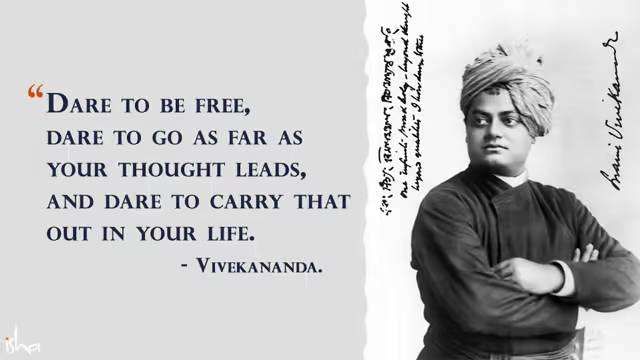
Swami Vivekananda was born Narendra Nath Datta to Vishwanath Datta and Bhuvaneshwari Devi, in Kolkata on 12th January, 1863. By the time he passed on at the Belur Mutt, on July 4, 1902, he had launched a revolution that still resonates around the world today. As a vehicle for his Guru’s message, he has been an inspiration for youth around the world for over a century.
In this article, Sadhguru looks at a few incidents from Swami Vivekananda’s life, that illustrate his relationship with his Guru and the message he carried.
1.Swami Vivekananda And Kali
Ramakrishna had a very different kind of attachment towards Vivekananda because he saw him as a means to take his message to the world. By himself, Ramakrishna could not do it and so he saw Vivekananda as a vehicle.
People around Ramakrishna did not understand why he was so mad about Vivekananda. If Vivekananda did not come to see him even for a day, Ramakrishna would go looking for him because he knew that this boy had the necessary perception to transmit. Vivekananda was equally mad about Ramakrishna Paramahamsa. He did not look for any employment, he did not do anything that people of his age are normally supposed to do. He just followed Ramakrishna all the time.
There is a very wonderful incident which occurred in Vivekananda’s life. One day, his mother was very ill and on her deathbed. Now it suddenly struck Vivekananda that there was no money in his hands and he was unable to provide her with the necessary medicine or food. It made him very angry that he was unable to take care of his mother when she was really sick. When a man like Vivekananda gets angry, he gets really angry. He went to Ramakrishna – there was nowhere else to go, even if he got angry, that was where he went.
He told Ramakrishna “All this nonsense, this spirituality, where is it getting me? If I was employed and had done the things that I was supposed to do, today I could have taken care of my mother. I could have given her food, I could have given her medicine, I could have given her comfort. Where has this spirituality taken me?”
Ramakrishna being a worshiper of Kali, had a Kali shrine in his house. He said “Does your mother need medicine and food? Why don’t you go and ask the Mother for what you want?” It sounded like a good idea to Vivekananda and he went into the shrine.
After about an hour, he came out and Ramakrishna asked, “Did you ask the Mother for food, money and whatever else your mother needs?”
Vivekananda replied, “No, I forgot.”
Ramakrishna said, “Go back inside again and ask.”
Vivekananda went into the shrine again and came back after four hours. Ramakrishna questioned him, “Did you ask the Mother?”
Vivekananda said “No, I forgot.”
Ramakrishna again said. “Go inside again and this time, don’t forget to ask.”
Vivekananda went inside and after almost eight hours, he came out. Ramakrishna again asked him, “Did you ask the Mother?”
Vivekananda said “No, I will not ask. I have no need to ask.”
Ramakrishna replied “That’s good. If you had asked for anything in the shrine today, this would have been the last day between you and me. I would not have seen your face ever again, because an asking fool does not know what life is about. An asking fool has not understood the very fundamentals of life.”
Prayerfulness is a certain quality. If you become prayerful, if you become worshipful, it is a fantastic way to be. But if you are praying with an expectation that you will get something, then it is not going to work for you.
2.The Proof Of God
When he was just 19 years of age, Vivekananda was a very logical, intellectual boy, and was full of fire. He wanted proper answers for everything. He came to Ramakrishna and asked, “You are talking God, God all the time. Where is the proof? Show me the proof!” Ramakrishna was so simple. He was not an educated man. He was a mystic, not a scholar. So he said, “I am the proof.”
Vivekananda did not know what to say because this was just utterly crazy. He was expecting some great intellectual explanation – “The proof of God is the seed sprouting and the planet spinning.” But Ramakrishna said, “I am the proof God exists.” “The way I am is the proof” – that is what Ramakrishna was saying. Vivekananda did not know what to say and he left.
Three days later, he came back and asked, “Okay, can you show me God?” Ramakrishna asked, “Do you have the courage to see?” The brave boy said, “Yes” because this was tormenting him. So Ramakrishna just placed his foot on Vivekananda’s chest and Vivekananda went into a certain period of samadhi where he was beyond the limitations of the mind. He did not come out of it for almost 12 hours and when he did, he was never the same boy again. He never asked another question in his life after that.
3.Vivekananda Gets Sharada’s Blessings
Unless you are a devotee, life should not open for you, because if it opens for you, you will only cause damage to yourself and everyone else. Knowledge in India was never ever handed over to a person who lacked devotion.
There is a beautiful incident in Vivekananda’s life. Ramakrishna Paramahamsa had passed on and Vivekananda gathered a band of young people, travelling throughout India, trying to build the nation and change the face of the country. Then someone told him that the Parliament of Religions was happening in Chicago, United States. They suggested he go there because no one was listening to him here. Nobody was! One young man running from place to place, trying to talk about big things which are not written in the scripture – who is willing to listen? They said, “You go and shake them there. If you shake them there, everyone here will take note of you.”
When he was about to leave for the West – the first time he was going to the United States to take the message of Ramakrishna – he went to Sharada, Ramakrishna’s wife, to seek her blessings.
She was cooking when he came. Sharada was humming a tune. It was very common for Indian women, particularly when they were cooking, to sing. Not anymore because many people play the iPad now, but earlier, one of the greatest things you could do was to cook well with utmost love and serve it to people. It was the greatest satisfaction for them to see someone eating well. Cooking was such a joyful, elaborate process. For a 20-30 minute meal, they would spend a minimum of three to four hours on it and they would always be singing. At least my mother was singing all the time.

When he came and said, “I want to go to the United States to take my master’s message to the whole world,” she did not respond. Then suddenly she said, “Naren, give me that knife.” Vivekananda handed over the knife to her and gave it to her in a particular way. Then Sharada said, “You may go, you have all my blessings.” Then he asked, “Why did you wait so long and first of all, why did you ask for the knife? You have finished cutting the vegetables.” She said, “I just wanted to see what you are after the master is gone. Now, the way you gave me the knife showed you are fit to go, you are fit to carry the master’s message.”
4.Swami Vivekananda and Ramakrishna’s Message
You can always see that most masters are not capable of becoming famous by themselves. They need one good disciple to carry the message because the master himself may not be very good with the ways of the world. Today, everyone is talking about Ramakrishna Paramahansa. Ramakrishna was a very crystallized consciousness. A phenomenon. But at the same time, on the worldly level, he was totally uneducated. By himself, he would have been a lost, forgotten flower if Vivekananda had not come. So many flowers bloom, but how many of them get recognized?
5.Swami Vivekananda On Prayer
Swami Vivekananda once said, “Kicking a football will take you closer to the Divine than any amount of prayer.” It is true, because you cannot play football unless you are absolutely involved . There is no personal intention in this, just involvement. What you can do and what you cannot do is already set and you have been trained for many years. Now it is just a question of involvement , no intention.
With prayer, after sometime you might be doing the prayer while you do so many other things – you could be doing whatever you want. In India, they made the prayers very complex – not just verbal, so that you have to involve yourself because they have seen all this “telling the prayer” business for thousands of years. They know what people will do so they made the prayer so complex, a whole procedure that you have to remember and act out properly, otherwise it is sacrilege. When that level of complexity is there, you cannot be doing something else during the prayer. So in that way a football game gets you into that level of involvement where you cannot be doing something else at all. Doing something else is totally absent and gone in you because you cannot do anything else, there is so much involvement in this.
In a soccer game, you have to learn to use your feet like a surgeon’s scalpel. This is a game which particularly demands a certain level of involvement because the limbs with which you handle the ball and the limbs with which you transport yourself at full speed are the same, and you have to avoid the ten other people who are trying to do everything that they can do with you. You have to dodge people, you have to take the ball, you have to be running at full speed; your feet must be as efficient as a surgeon’s scalpel because at that speed, at that activity, to direct the ball takes a phenomenal amount of skill. It takes a certain level of involvement where you are almost mindless.
If you do something with total involvement, you will see, there is just action – the mind is somewhere else. So in a soccer game, the players reach that kind of a state very often because it is all in one thing. That is the reason why it grabs half the world when things are being played intensely. There is a certain kind of transcendence – it is not really a spiritual transcendence, but there is a certain going beyond one’s limitations which sets fire to everybody else.
6.Swami Vivekananda On Women
Once, a certain social reformer went to Vivekananda and asked, “It is great that you also support women, what shall I do? I want to reform them. I want to support this.” Then Vivekananda said, “Hands off. You do not have to do anything about them; just leave them alone. They will do what they have to do.” This is all that is needed. It is not that a man has to reform a woman. If he just gives room, she will do what is necessary.
7.Swami Vivekananda’s Vision
When I was twelve or thirteen years of age, I happened to come across some literature in which Swami Vivekananda said, “Give me hundred truly dedicated people and I will change the face of this country.” At that time it seems there were two hundred and thirty million people in this country, but he could not find a hundred truly dedicated people. I thought, “What a tragedy! A man like Vivekananda is a phenomenon. He does not happen every day. When he comes, we could not even give him a hundred people in this vast country.” To me, it seemed like a great tragedy for this culture and this country.
One person had tremendous vision and because of one person's vision, so many things have happened. Even today, in his name, so much is happening for human wellbeing. A lot has happened because of his vision. All the others who lived at that time, where are they? But his vision is still working in some way. Much wellbeing has come because of it.
If thousands of people had carried the same vision , much better things would have happened. One Gautama Buddha or one Vivekananda having vision is not sufficient. Only when a large section of the population has vision, really beautiful things will happen in society.

Related Tags
Swami Vivekananda and His 1893 Speech
Photo of Swami Vivekananda in Chicago in 1893 with the handwritten words “one infinite pure and holy—beyond thought beyond qualities I bow down to thee”
Swami Vivekananda (1863–1902) is best known in the United States for his groundbreaking speech to the 1893 World’s Parliament of Religions in which he introduced Hinduism to America and called for religious tolerance and an end to fanaticism. Born Narendranath Dutta, he was the chief disciple of the 19th-century mystic Ramakrishna and the founder of Ramakrishna Mission. Swami Vivekananda is also considered a key figure in the introduction of Vedanta and Yoga to the West and is credited with raising the profile of Hinduism to that of a world religion.
Speech delivered by Swami Vivekananda on September 11, 1893, at the first World’s Parliament of Religions on the site of the present-day Art Institute
Sisters and Brothers of America,
It fills my heart with joy unspeakable to rise in response to the warm and cordial welcome which you have given us. I thank you in the name of the most ancient order of monks in the world, I thank you in the name of the mother of religions, and I thank you in the name of millions and millions of Hindu people of all classes and sects.
My thanks, also, to some of the speakers on this platform who, referring to the delegates from the Orient, have told you that these men from far-off nations may well claim the honor of bearing to different lands the idea of toleration. I am proud to belong to a religion which has taught the world both tolerance and universal acceptance. We believe not only in universal toleration, but we accept all religions as true. I am proud to belong to a nation which has sheltered the persecuted and the refugees of all religions and all nations of the earth. I am proud to tell you that we have gathered in our bosom the purest remnant of the Israelites, who came to Southern India and took refuge with us in the very year in which their holy temple was shattered to pieces by Roman tyranny. I am proud to belong to the religion which has sheltered and is still fostering the remnant of the grand Zoroastrian nation. I will quote to you, brethren, a few lines from a hymn which I remember to have repeated from my earliest boyhood, which is every day repeated by millions of human beings: “As the different streams having their sources in different paths which men take through different tendencies, various though they appear, crooked or straight, all lead to Thee.”
The present convention, which is one of the most august assemblies ever held, is in itself a vindication, a declaration to the world of the wonderful doctrine preached in the Gita: “Whosoever comes to Me, through whatsoever form, I reach him; all men are struggling through paths which in the end lead to me.” Sectarianism, bigotry, and its horrible descendant, fanaticism, have long possessed this beautiful earth. They have filled the earth with violence, drenched it often and often with human blood, destroyed civilization and sent whole nations to despair. Had it not been for these horrible demons, human society would be far more advanced than it is now. But their time is come; and I fervently hope that the bell that tolled this morning in honor of this convention may be the death-knell of all fanaticism, of all persecutions with the sword or with the pen, and of all uncharitable feelings between persons wending their way to the same goal.
Sign up for our enewsletter to receive updates.
- News and Exhibitions Career Opportunities Families
- Public Programs K-12 Educator Resources Teen Opportunities Research, Publishing, and Conservation
Gallery actions
Image actions, suggested terms.
- Free Admission
- My Museum Tour
- What to See in an Hour

Swami Vivekananda Biography, Early Life, Education, Legacy and Death
Swami Vivekananda was born as Narendranath Dutta in Calcutta in January 1863. Read all about Swami Vivekananda Biography, Early Life, Education, Legacy and Death for UPSC exam Preparation
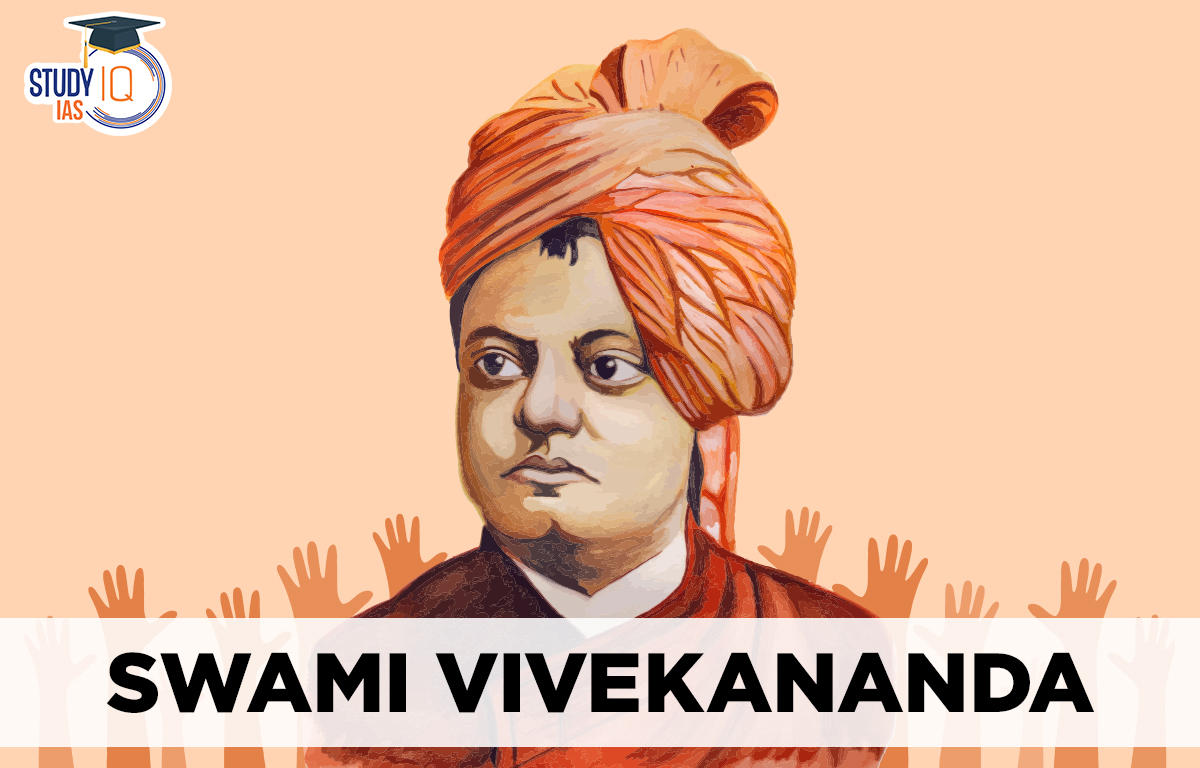
Table of Contents
Swami Vivekananda
Hindu monk Swami Vivekananda is regarded as one of India’s most illustrious spiritual figures. He was not merely a spiritual thinker; he was also a prolific writer, an effective orator, and a fervent nationalist. Swami Vivekananda advanced Ramakrishna Paramhansa’s free-thinking philosophy into a brand-new paradigm. He gave his all to his country, working relentlessly to improve society, serve the needy, and the underprivileged. Read all about Swami Vivekananda in this article for UPSC.
Swami Vivekanand was in charge of reviving Hindu spirituality and making Hinduism a respected religion over the world. His message of brotherhood between all people and self-awakening is still pertinent today, particularly against the backdrop of the current global political unrest. Many people have found inspiration in the young monk and his teachings, and his words—particularly for the nation’s youth—have evolved into self-improvement objectives. Because of this, India observes his birthday, January 12, as National Youth Day.
National Youth Day 2024
On January 12th, National Youth Day 2024 commemorates the birthday of Swami Vivekananda, a revered spiritual and social leader in India. This day serves as a tribute to his legacy and is dedicated to motivating young minds, fostering education, and promoting community service. The theme for National Youth Day 2024 is “Arise, Awake, and Realise the Power You Hold.” This celebration offers a platform to enlighten the youth about social consciousness, leadership, and responsibility through a diverse array of talks, events, and cultural activities. It aims to inspire and empower the younger generation to recognize and harness their potential for positive change in society.
Swami Vivekananda’s Early Life
Swami Vivekanand was one of the eight children of Vishwanath Dutta and Bhuvaneshwari Devi and was born in Calcutta as Narendranath Dutta into a wealthy Bengali family. On January 12, 1863, the day of Makar Sankranti, he was born. Father Vishwanath was a prominent member of society and a successful lawyer. Mother Bhuvaneshwari, who had a powerful, godly mind, had a significant influence on her son Narendranath.
Swami Vivekananda Education
Narendranath was a bright little boy who showed intelligence. His playful demeanour belied his love of vocal and instrumental music. His academic performance was outstanding both at the Metropolitan institution and the Presidency College in Calcutta. By the time he received his college degree, he had broadened his knowledge of several subjects.
He participated in athletics, wrestling, gymnastics, and bodybuilding. He read voraciously and learned practically everything there was to know. He studied western philosophy, history, and spirituality by David Hume, Johann Gottlieb Fichte, and Herbert Spencer in addition to Hindu scriptures like the Bhagvad Gita and the Upanishads.
Swami Vivekananda Biography
Despite growing up in a religious environment at home and having a pious mother, Narendranath experienced a severe spiritual crisis in his early years. His in-depth understanding caused him to begin to doubt the existence of God, and for a while, he held an agnostic belief. However, he was unable to deny the presence of a Supreme Being.
For a while, he was involved with the Keshab Chandra Sen-led Brahmo Movement. Unlike the idol-worshipping, superstitious Hinduism, the Bramho Samaj recognized only one God. He was left with a plethora of unsolved philosophical issues about whether God existed. Vivekananda first learned of Sri Ramakrishna during this period of spiritual difficulty through William Hastie, the Principal of the Scottish Church College.
Swami Vivekananda Lecture at World Parliament
He learned about the World Parliament of Religions, which took place in Chicago, America, in 1893, while he was travelling. In order to represent India, Hinduism, and his Guru Sri Ramakrishna’s teachings, he was eager to attend the gathering. While contemplating on the rocks of Kanyakumari, India’s southernmost tip, he experienced the affirmation of his wishes. On May 31, 1893, Vivekananda, Raja of Khetri, and Ajit Singh departed from Bombay for Chicago after money was donated by his followers in Madras (now Chennai).
On his journey to Chicago, he endured unfathomable challenges, yet his enthusiasm never wavered. When it was time, on September 11, 1893, he entered the platform and startled everyone with the words “My brothers and sisters of America.” The audience applauded him standing ovation for the opening sentence. He continued by elaborating on Vedanta’s philosophical foundations and their spiritual relevance, putting Hinduism on the map of major world religions.
He stayed in America for the following 2.5 years, starting the Vedanta Society of New York in 1894. He also went to the UK to spread the teachings of Hindu Spiritualism and Vedanta to the western world.
Swami Vivekananda Legacy
The actual pillars of India’s national unity were unveiled to the world by Swami Vivekananda. He demonstrated how a country with such a wide range of cultures can be brought together by a sense of brotherhood and humanity. Vivekananda addressed the shortcomings of western civilization as well as India’s role in overcoming them. Swamiji brought together the East and the West, religion and science, the past and the present, as Netaji Subhash Chandra Bose famously said. He is great because of this.
His lessons have helped our countrymen develop unparalleled levels of self-respect, self-reliance, and self-assertion. Vivekananda was effective in creating a fictitious link between Eastern and Western cultures. He provided Westerners with interpretations of Hindu scriptures, philosophy, and way of life. He helped them understand that, despite its underdevelopment and poverty, India had a significant cultural contribution to contribute. He was instrumental in breaking India’s cultural barrier to the rest of the globe.
Swami Vivekananda Death
It was predicted by Swami Vivekananda that he would not live past the age of forty. He continued his day’s work at the Belur Math, instructing the students in Sanskrit grammar, on July 4, 1902. In the evening, he retired to his room, and about nine, he passed away while meditating. The renowned saint was burned on the banks of the Ganges after allegedly achieving “Mahasamadhi.”
Swami Vivekananda UPSC
- Swami Vivekananda was born in Calcutta in January 1863 as Narendranath Dutta.
- Ramakrishna Paramahamsa, who later served as Swami Vivekananda’s Guru, had an influence on him.
- As a monk, Swami Vivekananda traversed all of India and the West.
- Especially Advaita Vedanta and Yoga philosophies, his works and lectures significantly contributed to the propagation of Hindu philosophy in the West..
- He formally took monastic vows in 1886.
- Swami Vivekananda founded numerous Mathas in India, with the Belur Math in Belur, Howrah district, being the most significant.
- The Ramakrishna Mission was established by Swami Vivekananda in May 1897.
- Swami Vivekananda passed away in West Bengal’s Belur Math in 1902.
Swami Vivekananda FAQs
Q) What was Swami Vivekananda famous for?
Ans. The most famous speech given by Swami Vivekananda (1863–1902) during the 1893 World’s Parliament of Religions, in which he introduced Hinduism to America and appealed for religious tolerance and an end to extremism, is what makes him famous in the United States.
Q) What is Swami Vivekananda story?
Ans. In the midst of the Makar Sankranti festival on January 12, 1863, in his ancestral house at 3 Gourmohan Mukherjee Street in Calcutta, the capital of British India, Vivekananda was born Narendranath Datta. He was one of nine siblings in a conventional family.
Q) Was Vivekananda a freedom fighter?
Ans. Swami Vivekananda served as one of the most inspiring intellectual fervor behind the Indian freedom struggle.
Q) What is the slogan of Vivekananda?
Ans. A slogan by Swami Vivekananda is ‘arise, awake, and stop not till the goal is reached.
Major Incidents in Indian History
- Quit India Movement
- Chauri Chaura Incident
- Jallianwala Bagh Massacre
- Green Revolution in India
- Non-Cooperation Movement
Famous Personalities Biography
Sharing is caring!

What was Swami Vivekananda famous for?
The most famous speech given by Swami Vivekananda (1863–1902) during the 1893 World's Parliament of Religions, in which he introduced Hinduism to America and appealed for religious tolerance and an end to extremism, is what makes him famous in the United States.
What is Swami Vivekananda story?
In the midst of the Makar Sankranti festival on January 12, 1863, in his ancestral house at 3 Gourmohan Mukherjee Street in Calcutta, the capital of British India, Vivekananda was born Narendranath Datta. He was one of nine siblings in a conventional family.
Was Vivekananda a freedom fighter?
Swami Vivekananda served as one of the most inspiring intellectual fervor behind the Indian freedom struggle.
What is the slogan of Vivekananda?
A slogan by Swami Vivekananda is 'arise, awake, and stop not till the goal is reached

Leave a comment
Your email address will not be published. Required fields are marked *
Save my name, email, and website in this browser for the next time I comment.
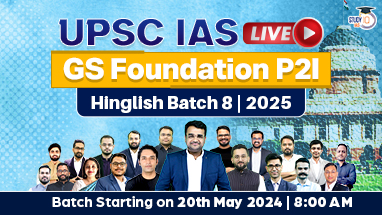
- UPSC Online Coaching
- UPSC Exam 2024
- UPSC Syllabus 2024
- UPSC Prelims Syllabus 2024
- UPSC Mains Syllabus 2024
- UPSC Exam Pattern 2024
- UPSC Age Limit 2024
- UPSC Calendar 2024
- UPSC Syllabus in Hindi
- UPSC Full Form
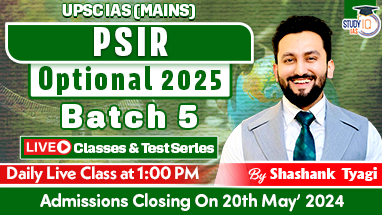
Recent Posts
- UPPSC Exam 2024
- UPPSC Calendar
- UPPSC Syllabus 2024
- UPPSC Exam Pattern 2024
- UPPSC Application Form 2024
- UPPSC Eligibility Criteria 2024
- UPPSC Admit card 2024
- UPPSC Salary And Posts
- UPPSC Cut Off
- UPPSC Previous Year Paper
BPSC Exam 2024
- BPSC 70th Notification
- BPSC 69th Exam Analysis
- BPSC Admit Card
- BPSC Syllabus
- BPSC Exam Pattern
- BPSC Cut Off
- BPSC Question Papers
IB ACIO Exam
- IB ACIO Salary
- IB ACIO Syllabus
CSIR SO ASO Exam
- CSIR SO ASO Exam 2024
- CSIR SO ASO Result 2024
- CSIR SO ASO Exam Date
- CSIR SO ASO Question Paper
- CSIR SO ASO Answer key 2024
- CSIR SO ASO Exam Date 2024
- CSIR SO ASO Syllabus 2024
Study Material Categories
- Daily The Hindu Analysis
- Daily Practice Quiz for Prelims
- Daily Answer Writing
- Daily Current Affairs
- Indian Polity
- Environment and Ecology
- Art and Culture
- General Knowledge
- Biographies
IMPORTANT EXAMS

- Terms & Conditions
- Return & Refund Policy
- Privacy Policy
- Weight Loss
- Mental Health
- Relationships
- Find a solution for...
- Meditation – Overview
- Happiness Program
- Happiness Program for Youth
- Sahaj Samadhi Dhyana Yoga
- Online Meditation and Breath Workshop
- Advanced Meditation Program
- Dynamism for Self & Nation (DSN)
- Blessings Program
- Sudarshan Kriya Follow-Ups
- Volunteer Training Program
- Teacher Training Program
- Children and Teens – Overview
- Utkarsha Yoga
- Medha Yoga Level 1
- Medha Yoga Level 2
- Intuition Process
- Know Your Child Workshop
- Know Your Teen Workshop
- Corporate Programs
- Workshop to Get Rid of Anxiety & Sleep Disorder
- The Art Of Living Programs For Schools
- Sri Sri Sanskar Kendra
- Yoga – Overview
- Sri Sri Yoga Classes (Level 1)
- Sri Sri Yoga Deep Dive (Level 2)
- Yoga Teacher Training
- Sri Sri Yoga Retreats
- SpineCare Yoga and Posture Program
- The Art of Living Programs for Schools
- Karma Yoga (YLTP)
- Wisdom – Overview
- Events – Overview
- World Culture Festival
- Maha Shivratri
- International Women’s Conference
- World Forum for Ethics in Business
- Global Leadership Forum
- Guinness World Records Events
- Social Impact – Overview
- Rural Development
- Organic Farming
- Environment care
- Women Empowerment
- Disaster Relief
- Prison Program
- Water Conservation
- River Symposium
- Social Impact
- The Art of Living
- About Gurudev
- Sudarshan Kriya
- India - English
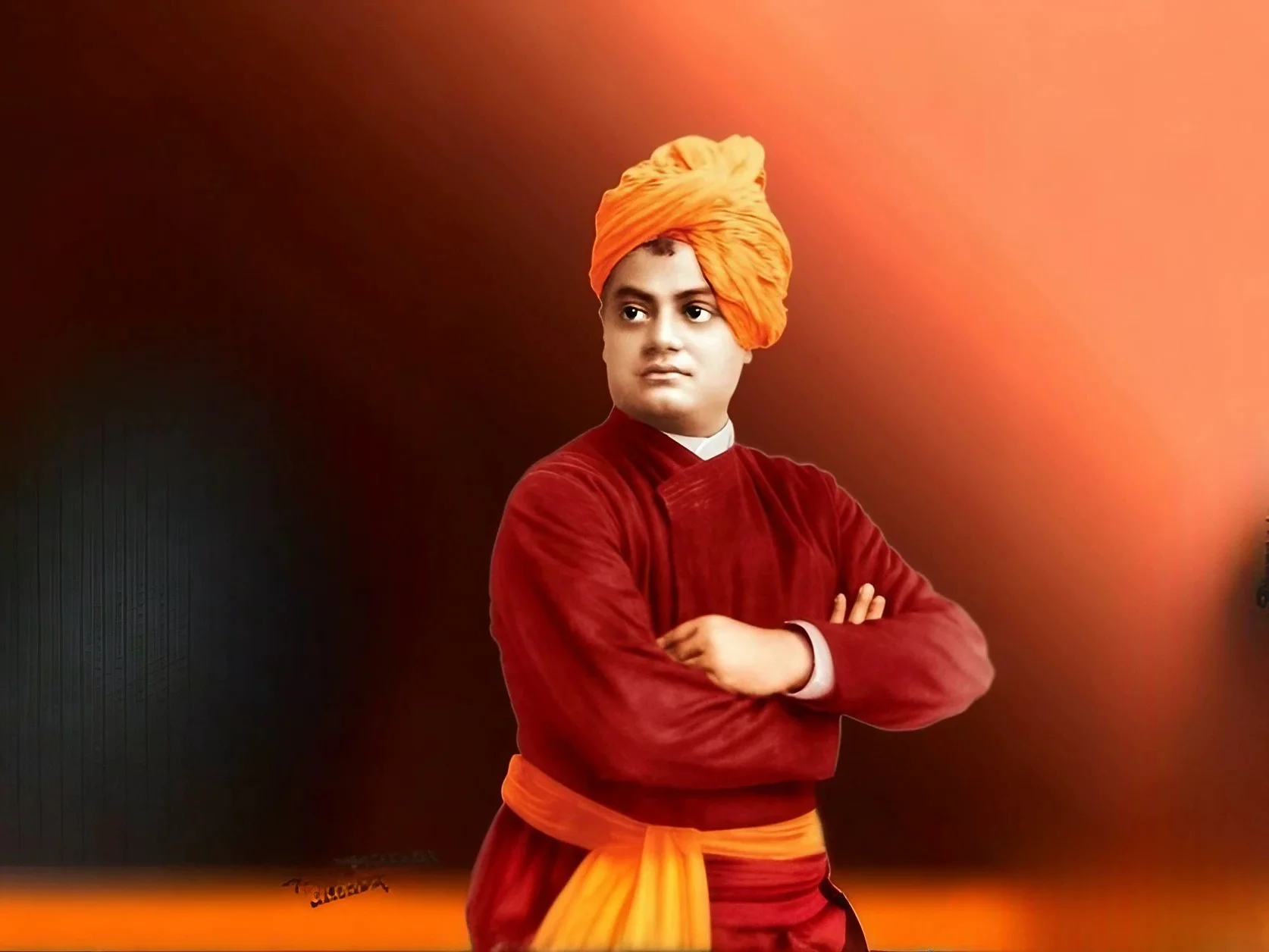
8 Life Lessons from Swami Vivekananda’s Life
In Swami Vivekananda , one finds the perfect convergence of love for the Divine and love for the nation. He is an eternal inspiration for the youth. ~ Gurudev Sri Sri Ravi Shankar
Swami Vivekananda’s birth anniversary is declared as National Youth Day. The original youth icon. Somebody who continues to inspire generations. Although there are many things to learn from the lives of great people of the past, rarely do we know how to implement the lessons. To make it easier for you, we have first listed seven wonderful lessons from Swami Vivekananda’s life and ways to imbibe them in our own.
PS: These lessons are very simple. They can be inculcated at any stage of life. For this world needs sensitive, compassionate and kindness from everyone.
In a nutshell Life Lessons from Swami Vivekananda
- Lesson 1: Humility is a precious virtue
Lesson 2: Curiosity is essential in life
Lesson 3: compassion and kindness are ever golden.
- Lesson 4: With prayer, we can sail through any storm
Lesson 5: Work for preserving unity
Lesson 6: respect for culture and belief is necessary, lesson 7: have a holistic perspective, lesson 8: humor is a sign of intelligence, an exemplary life.
Who was Swami Vivekananda? He represents an ideology, courage, progressive thinking, strength and wisdom. A legend among people. Born as Narendra Nath Dutta on January 12, 1863, Swami Vivekananda had seven siblings. From childhood, Narendranath was a very sharp child and consistently excelled in academics. During his childhood, India was under the British rule. He initially abstained from studying the English language for some time knowing that it is the language of the Britishers, but later he had to learn it as it was a part of his syllabus. He got interested in many subjects such as sports, music, gymnastics, wrestling, bodybuilding etc.
He completed his M.A in philosophy from a college in Kolkata and later became a great scholar of philosophy. His teachings emphasised on different aspects of religion, faith, education, spirituality, and humanity. He undertook the mission of spreading the knowledge of his Guru, Ramakrishna Paramahansa.
Later, Narendranath came to be known as Swami Vivekananda. Among his many other works, the Brahmo Samaj and Ramakrishna Mission were committed to work for the welfare of society, spread religious harmony and eradicate poverty and misery.
A man with such high thinking and simple living has lived a life that can be a lesson for all of us. Let’s take a look at some of the famous stories from his life:
Lesson 1: Humility is a precious virtue
I recollect the many inspiring bedtime stories my dad read to me. One such incident happened when Swami Vivekananda was in England. While conversing, Swami Vivekananda corrected his friend’s English. The friend retorted that English was his mother tongue and hence, could not be corrected.
Swami Vivekananda smiled and humbly responded, “I know the use of language because I have learnt the language while you have picked the language.” Listening to this witty reply, the friend was left overwhelmed.
This is one of innumerable incidents where Swamiji impacted society with his brilliance, knowledge, logic and a sense of compassion.
Life’s lesson:
There are times when people retort and ask us questions, especially when we correct them. In such times, humility in our answer can help lighten the situation and save the bond from breaking. Remembering Swami Vivekananda’s this story can help us be aware of our replies, without losing the balance or getting offended.

Swami Vivekananda always had a quest to know whether God really exists? The query made him restless. But Ramakrishna answered his question. He said, “Yes, I have seen God.”
Though his physical appearance and simplicity did not appeal to Swami Vivekananda initially, but later it was Ramakrishna who gave him answers. He told Swami Vivekananda, “I have seen God just as I am seeing you right now. God is in every human, you just need is an eye to find him,” and Swami Vivekananda was convinced.
We must strive to get the best and holistic answers to ease out our curiosity about life. Curiosity about higher truths of life has transformed many lives. Remember, appearance can be deceiving!
One day Swami Vivekananda’s mother asked him to give her a knife. Swami Vivekananda brought the knife and held the sharp side of the knife and gave the covered side to his mother. The mother at once got impressed with him and told him he was ready to work for the welfare of society. He asked his mother the reason for her thoughts. She replied: The way you handed me the knife, holding the sharp side in your hand preventing me from getting hurt, exhibited his compassion and kindness. It is said she further asked Swami Vivekananda to have the same care and compassion for all the people and the society.
Many a time, we exhibit small acts of kindness around our loved ones and friends. We can encourage human values by praising their good qualities, thus enabling them to continue doing good in society. Also, compassion and kindness is inherent in each one of us.
Lesson 4: With prayer, we can sail through any situation
When Swami Vivekananda’s family was in a crisis, he asked Ramakrishna to pray for them. Listening to this, Ramakrishna suggestion was that he visited the temple and pray himself. Swami Vivekananda visited the temple thrice. However, he instead asked for discretion (viveka) and dispassion (vairagya). This marked the beginning of his spiritual life.
In turbulent times, our prayer defines our virtue. Gurudev Sri Sri Ravi Shankar says that you will not be given strength, but the opportunity to be strong. Similarly, you will not be given faith, but an opportunity to have faith. Thus, asking for the right thing in prayer can bring great depth in the way we lead life and help us invoke the inner strength to sail through the storms.
Swami Vivekananda went to the World Parliament of Religions as a representative of the Hindu religion. It was a prestigious platform to put forth the right understanding and the fundamentals of Hinduism. In the parliament, there were many eloquent speakers who had come well-prepared for their respective speech.
Let’s go deeper into discovering amazing India! This country has a wealth of spiritual and wellness knowledge. Untap some of those secrets and discover your potential with these timeless wisdom nuggets. Know more at The Art of Living Meditation and Breath program.
When Swami Vivekananda’s turn came, he addressed the audience as ‘sisters and brothers of America’ which became very popular. His way of speaking connected with the audience.

With our words, we can make people feel comfortable in our presence or repel them. Having purity of speech is a prerequisite if we want to build and sustain cordial relations in this world, especially in the corporate world. Warm and kind words have a great potential to strike the chord of brotherhood and oneness in people.
Mahatma Gandhi visited the Belur Math in 1921 and spoke on Swami Vivekananda’s birth anniversary:
“I have gone through his works very thoroughly, and after having gone through them, the love that I had for my country became a thousand fold. I ask you, young men, not to go away empty-handed without imbibing something of the spirit of the place where Swami Vivekananda lived and died.”
One day, a Britisher commented that the Indian dressing style was ‘uncivilized’. Swami Vivekananda replied, “In your culture, cloth builds a man but in our culture, character builds a man’. This story became very famous the world over, showcasing Swami Vivekananda’s deep understanding of the world.
Let’s respect our culture and traditions. Culture, traditions and beliefs make every community unique. And our own reasoning about their significance, importance enables us to help clear others’ doubts, perception or ideas.
At the World Parliament of Religion, Swami Vivekananda observed that the Indian epic, the Bhagavad Gita, was kept at the lowest rank. This can have many interpretations, but what impressed me was the way Swami Vivekananda began his speech. Referring to the position of the Bhagavad Gita, he said, ‘…good foundation’. He gave a witty answer and felt proud instead of feeling inferior about Hinduism.
A thorough understanding of your belief and religion can shape your perspective in a holistic way. It helps us get a deeper understanding of our culture and also we can explore other cultures with equal respect.
The famous Chicago speech at the Parliament of World Religions, 1893: “I am proud to tell you that we have gathered in our bosom the purest remnant of the Israelites, who came to Southern India and took refuge with us in the very year in which their holy temple was shattered to pieces by Roman tyranny. I am proud to belong to the religion which has sheltered and is still fostering the remnant of the grand Zoroastrian nation. I will quote to you, brethren, a few lines from a hymn which I remember to have repeated from my earliest boyhood, which is every day repeated by millions of human beings: “As the different streams having their sources in different paths which men take through different tendencies, various though they appear, crooked or straight, all lead to Thee.”
An excerpt from the closing ceremony: The seed is put in the ground, and earth and air and water are placed around it. Does the seed become the earth, or the air, or the water? No. It becomes a plant. It develops after the law of its own growth, assimilates the air, the earth, and the water, converts them into plant substance, and grows into a plant. Similar is the case with religion. The Christian is not to become a Hindu or a Buddhist, nor a Hindu or a Buddhist to become a Christian. But each must assimilate the spirit of the others and yet preserve his individuality and grow according to his own law of growth.
Gurudev once shared a story from Swami Vivekananda’s life. Here’s the excerpt:
“At a restaurant, Swami Vivekananda sat at the same table with his professor. The professor remarked: “A pig and a bird can’t dine at the same table.”
Swami Vivekananda replied, “Sir, whenever you tell me, I will fly away.”
Intelligence has the ability to turn every conflict into humor. Humor is another sign of intelligence. If you have humor, you will overcome any conflicting situation.”
Like Gurudev summed up, humor is a sign of intelligence. We can make times good and even most dramatic circumstances lighter with humor.
Through his reforms, Swami Vivekananda brought a remarkable change in the society. His work, thoughts, ideas gave a new direction to the masses. Reading and knowing about the life of Swami Vivekananda is very inspiring for the youth of today and will remain the same for the upcoming generations.
With these valuable lessons, here’s to a new 2020! Some lessons life teaches us, but there are some lessons that we can learn from others.
Swami Vivekananda’s teachings will ensure a happier life for us and others.
And here’s a quick tip. If you’re wondering how to imbibe these lessons in your life, here’s a secret to live with joy and selfless service:
- Meditate: Increase your potential and happiness quotient. Everyday activities and frustrations of the day can make us stressed. But when you practice effortless meditation everyday for 20 minutes, it throws out toxins, and keeps your mind fresh. Awareness increases in a fresh mind. So, start meditating today!
- Yoga : Yoga is an easy way of maintaining the mind-body complex and keeping it healthy. Good mental and physical health will enable you to help others and live with joy yourself. Simple yoga asanas will give a boost to your health.
- Personality Development
You may like:
9 life lessons to learn from children.

Multicultural Education: Gurudev's Approach To Combating Terrorism
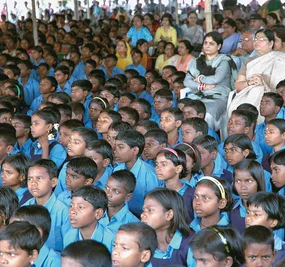
A brief history of yoga: Through the ages
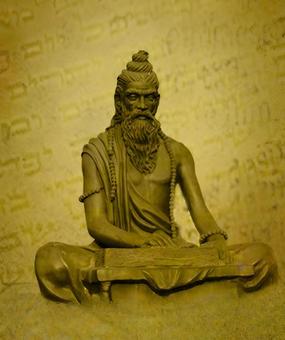
7 teachings From Guru Gobind Singhji for a happier life
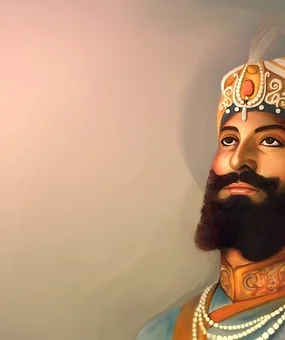
Spiritualizing Politics: Bridging the Gap between Spirituality and Governance
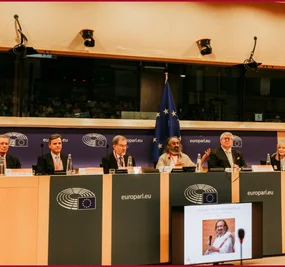
Journey of Ravi Meher: From an unknown cobbler to becoming Mayor of Sakri

Beginner (in person)

Beginner (online)

Children and Teens

Lessons from Ramayana
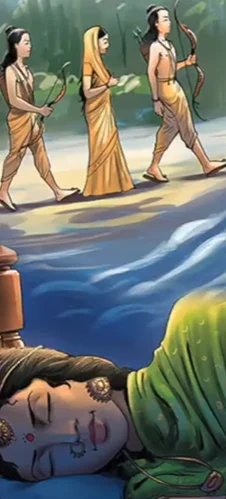
The Perfect Life Partner

How to pick a life partner?
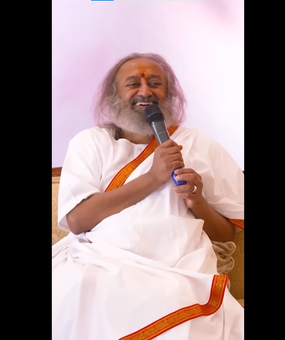
Where your life is stuck?

Don't shy away from Criticism

How to Develop Healthy Habits for A Better Life

Essay on Swami Vivekananda for Students and Children
500+ words essay on swami vivekananda.
Born as Narendranath Dutta on 12 th January 1863 in the holy and divine place of Kolkata, Swami Vivekananda was a great Indian saint. He was a figure with “high thinking and simple living”. He was a great pious leader, a philosopher, and also a devout personality with great principles. His eminent philosophical works comprise of “Modern Vedanta” and “Raj Yoga”. He was a principal disciple of “Ramkrishna Paramhansa” and was an initiator of Ramkrishna Math and Ramkrishna Mission . He thus spent his whole life in the dispersion of the values embedded in the great Indian culture.

Childhood Days
Swami Vivekananda , the son of Shri Vishwanath and mother Bhuvneshwari Devi was called by the name “Narendranath Dutta” in the early days. Narendra was a child of unquestioned expertise and intellectual capability who used to take grasp of all his school teachings at first sight.
This excellence was recognized by his Gurus and thus was named “Shrutidhar” by them. He possessed manifold talents and skills comprising of swimming, wrestling which were a part of his schedule. Influenced by the teachings of Ramayana and Mahabharata, he had bottomless respect for religion. “Pavan Putra Hanuman” was his ideal for life.
Narendra was a lover of heroism and mystical by nature. Despite his upbringing in a spiritual family, he owned an argumentative personality in his infancy. His entire beliefs were assisted by an apt rationale and judgment behind them. Such a quality made him even put a question on the existence of the Almighty. He thus visited several saints and asked each one “have you seen God?”His spiritual quest left unanswered until he met “Ramkrishna Paramhansa”.
Meeting with Ramkrishna Paramhansa and Harmonization of Indian Culture
Swami Vivekananda met Ramkrishna Paramhansa for the first time when the latter visited his friend’s residence in Kolkata. Conscious of the supernatural powers of Swami Vivekananda called him to Dakshineshwar. He had a deep insight that Swamiji’s birth was a boon to mankind for the upliftment of the universe. Fulfillment of his spiritual inquisitiveness made he finally acknowledge Ramkrishna Paramhansa in the figure of his “Guru”. He was moved from darkness to illumination by his “Guru”. As his deep gratitude and reverence for his Guru made him travel all the four directions for the diffusion of his Guru’s teachings.
Swamiji won the hearts of everyone by his incredible speech at Chicago by addressing the audience as “Sisters and Brothers of America”
Vivekananda quoted these words” I am proud to belong to a religion which has taught the world both tolerance and universal acceptance. We believe not only in universal tolerance but we accept all religions as true.” Thus, he set forward the worth of Indian religion exhibiting the values of universal acceptance, oneness, and harmony despite multiplicity in cultures.
Netaji Subhash Chandra Bose once said,” Swamiji harmonized the East and the West, religion, and science, past and the present and that is why he is great.” He played a prominent role in ending India’s cultural remoteness from the rest of the world.
A figure of highest ideals and great thoughts, Swamiji was an inspiration for the Youth of India. Through his teachings he wanted to fill the young brains with the powers of self-realization, character formation, to recognize inner strengths, service to others, an optimistic outlook, tireless efforts and a lot more.
Get the huge list of more than 500 Essay Topics and Ideas
Other Great Works by Swami Vivekananda
His famous quotations include, “Arise, awake and stop not till the goal is reached.” He also added that anything making a child physically, intellectually and spiritually weak must be rejected as a poison. He also emphasized on an education that leads to character formation.
His establishment of “Ramkrishna Math” and “Ramkrishna Mission” was a sign of “Guru Bhakti”, his sacrifice, austerity, and service of the poor and the downtrodden people of India. He was also a founder of Belur Math.
He spread the message of divinity and the true aims of scriptures. This great patriotic monk of the Mother Earth took his last breath on 4 th July 1902 at Belur Math.
Swamiji carried the messages of the rich and varied heritage of Indian culture and Hinduism, non-duality, selfless love, and service towards the nation. His mesmerizing personality with the highest virtues illuminated the young minds. His teachings aroused the realization of the power of the soul in them.
Thus, we celebrate his “Avtaran Divas” 12 th January, as the National Youth Day with great zeal and enthusiasm.
Customize your course in 30 seconds
Which class are you in.

- Travelling Essay
- Picnic Essay
- Our Country Essay
- My Parents Essay
- Essay on Favourite Personality
- Essay on Memorable Day of My Life
- Essay on Knowledge is Power
- Essay on Gurpurab
- Essay on My Favourite Season
- Essay on Types of Sports
Leave a Reply Cancel reply
Your email address will not be published. Required fields are marked *
Download the App

- India Today
- Business Today
- Reader’s Digest
- Harper's Bazaar
- Brides Today
- Cosmopolitan
- Aaj Tak Campus
- India Today Hindi
The Narendra who meditated in Kanniyakumari 131 years ago
Prime minister narendra modi is meditating in kanniyakumari. it was exactly 131 years ago that narendra, after meditating there, left to deliver the iconic speech at the world parliament of religions in chicago. the world would later know him as swami vivekananda. this is how his meditation in kanniyakumari changed hinduism's profile..
Listen to Story

Narendra swam to one of the rocks in Kanniyakumari, the southernmost tip of the Indian mainland, and sat on it for three days to meditate. There he got the vision of a modern India. On May 31, 1893, exactly 131 years ago, he left for Chicago to deliver the speech at the World Parliament of Religions that would go on to become one of the most iconic speeches of all time.
The world would later know Narendra, then just 30, as Swami Vivekananda.
That was in 1893. In 2024, another Narendra, the Prime Minister, is going to meditate for two days on one of the rocks at the Vivekananda Rock Memorial in Kanniyakumari, also called Kanyakumri.
The memorial is named after Swami Vivekananda, born Narendranath Dutta and referred to as Naren by his spiritual teacher Ramakrishna Paramahansa, who sat there to meditate after his tour of India.
Prime Minister Narendra Modi, after his whirlwind tour of India for the 2024 Lok Sabha election, will be sitting in Kanyakumari to meditate. A third term for Modi would see the government work for a Viksit Bharat, a developed India.
It is here in Kanyakumari that Vivekananda, too, got the vision of a modern India.
It is the date and the location that are uncannily coincidental.
After meditating in Kanyakumari, Swami Vivekananda on May 31, 1893, set sail from Bombay (now Mumbai) for the US aboard the SS Peninsular, according to the website of the Vivekananda Vedanta Society of Chicago.
He wore a saffron turban and robe and the first American newspaper report on Swami Vivekananda, published on September 11, 1893, refers to him as a "learned Brahman Hindoo" with a "smooth countenance". "His rather fleshy face is bright and intelligent," says the Chicago Record report.
SWAMI VIVEKANANDA'S JOURNEY TO THE US
Swami Vivekananda got to know about the World Parliament of Religions in 1892 while travelling around India.
Charmed by the young monk's knowledge of ancient scriptures and visionary outlook, people requested him to represent the Hindu religion at the world's biggest congregation of religious leaders.
It was only in April 1893 that Swami Vivekananda firmed up his plan to travel to the US to attend the Parliament of Religions. He was travelling to the US on a shoestring budget.
He boarded the SS Peninsular at Bombay on May 31, 1893, and reached Vancouver on July 25. From there he took a train and reached Chicago on July 30.
Finding it difficult to live in Chicago, he travelled to relatively cheaper Boston and, with the help of some Good Samaritans, returned later to Chicago for the Parliament of Religions.
On September 10, a day before the inaugural session of the Parliament of Religions, Swami Vivekananda, hungry and exhausted, begged for food. People turned him away and doors were slammed on him, according to the Chicago Vedanta portal.
As he sat on the pavement resigning himself to fate, the doors of the house opposite opened, and a dignified woman, Mrs George W Hale, approached Vivekananda and took him into her house.
VIVEKANANDA'S LANDMARK SPEECH IN CHICAGO
The Parliament of Religions opened on the morning of September 11, 1893, with 10 strokes of a bell dedicated to the 10 religions being represented there.
The hall had a capacity to accommodate 4,000 people.
The event started with a welcome note and responses by the delegates, and Swami Vivekananda sat through it all. Meditating in silence.
"Swami Vivekananda remained seated, meditative, and prayerful, letting his turn to speak go by time and again. It was not until the afternoon session, and after four other delegates had read their prepared papers, that he arose to address the congress," says the Vivekananda Society of Chicago website.
Then Swami Vivekananda spoke.
"Sisters and Brothers of America," he began, but had to stop as thunderous applause greeted him and continued for several minutes.
Americans were amazed that a saffron-robed monk would address them as sisters and brothers and make them his own.
"It fills my heart with joy unspeakable to rise in response to the warm and cordial welcome which you have given us," he said in response to the welcome speech.
"I thank you in the name of the most ancient order of monks in the world, I thank you in the name of the mother of religions, and I thank you in the name of millions and millions of Hindu people of all classes and sects."
Swami Vivekananda spoke about religious persecution and how India had sheltered the "remnant of the grand Zoroastrian nation". He quoted the Gita to speak about Hinduism as a universal religion, and wished a "death-knell of all fanaticism, of all persecutions with the sword or with the pen".
After the brief but impactful speech opening the day, Swami Vivekananda spoke again on September 15 on 'Why We Disagree'.
On September 19, he presented his 'Paper on Hinduism', which The Chicago Herald called the most interesting feature of the day.
On September 23, Swami Vivekananda spoke about 'Orthodox Hinudism' in a packed hall. Thousands had come to hear the sanyasi who had been changing their ideas with his philosophy.
"Questions were asked by auditors and answered by the great Sannyasi with wonderful skill and lucidity. At the close of the session, he was thronged with eager questioners who begged him to give a semi-public lecture somewhere on the subject of his religion," according to a report in The Chicago Inter Ocean.
On September 27, the final day of the Parliament of religions, Swami Vivekananda ended his speech with a call for "assimilation and not destruction", something that will always remain a key if the human species is meant to survive and prosper.
The speeches, delivered 131 years ago, sounds as fresh, refreshing and visionary as if written just today.
SWAMI VIVEKANANDA AND KANNIYAKUMARI'S ROCK MEMORIAL
The Vivekananda Rock Memorial in Kanniyakumari is located on a rock in the sea, about 500 metres from the mainland.
"Amid the soothing sea breeze and dancing waves is a rock, so enigmatic and elegant. It’s a tribute to India’s greatest monk who took this land’s spiritual brilliance to the world. The Vivekananda Rock Memorial is as timeless as the sage himself," says the Tamil Nadu Tourism website.
A ferry service from the Ferry Point on Kanniyakumari beach provides tourists and pilgrims access to the Vivekananda Rock Memorial, which also has a meditation hall -- the Dhyan Mandapam.
This is where Prime Minister Narendra Modi will be meditating for 45 hours, from Thursday (May 30) evening.
After the 2019 election campaign, PM Modi spent 15 hours in 'ekantavaas' meditating in a cave in Kedarnath.
The Opposition, however, alleged the PM's meditation at Vivekananda Rock Memorial to be a political stunt, like it did in 2019.
An ardent follower of Swami Vivekananda, PM Modi's meditating here is symbolic as it is here that Narendra got the vision of a modern India. PM Modi had made the goal of 'Viksit Bharat' by 2047, 100 years of India's Independence, a major Lok Sabha election issue.
It is significant politically too. The BJP started its 2024 Lok Sabha election campaign from Tamil Nadu , and it is here that its main campaigner will land up as the campaign period ends.
- International
- Today’s Paper
- 🗳️ History of Elections
- Premium Stories
- 🇮🇳 Elections 2024
- Brand Solutions
Why Prime Minister Modi will meditate at Kanyakumari’s Vivekananda Rock
In 1892, swami vivekananda swam to the rock off the southern tip of mainland india, and meditated for three days and nights..
(Written by Anagha Jayakumar)

Prime Minister Narendra Modi announced on Tuesday (May 28) that he will visit and meditate at the Vivekananda Rock Memorial in Kanyakumari , Tamil Nadu , from May 30 to June 1 to mark the culmination of BJP ’s Lok Sabha election campaign.
This marks a callback to his two-day visit to Uttarakhand’s Kedarnath shrine at the end of the 2019 election campaign, where he undertook a 15-hour-long ekantvaas (solitary meditation).
Here is what may be behind the prime minister’s decision to meditate in Kanyakumari.
The rock where Swami Vivekananda attained enlightenment
The Vivekananda Rock is a tiny rocky islet located some 500 metres from Kanyakumari’s Vavathurai beach, the southern tip of mainland India, at the confluence of the Indian Ocean, the Arabian Sea and the Bay of Bengal. Today, it is accessed via a 15-minute ferry service from Vavathurai.

In 1892, however, Swami Vivekananda, the revered Hindu philosopher-saint, swam from the shores of Kanyakumari to the rocky islet to meditate. His disciples believe that he meditated there for three days and three nights, and attained enlightenment. Swami Vivekananda had been wandering for four years across the length and breadth of India, and at Kanyakumari, finally formulated his philosophy
As he wrote to Swami Ramkrishnananda (not to be confused with his guru, Sri Ramakrishna) in 1894: “At Cape Comorin sitting in Mother Kumari’s temple, sitting on the last bit of Indian rock, I hit upon a plan: We are so many Sannyasins wandering about, and teaching the people metaphysics — it is all madness. Did not our Gurudeva use to say, “An empty stomach is no good for religion?” That those poor people are leading the life of brutes is simply due to ignorance. We have for all ages been sucking their blood and trampling them underfoot” (as quoted in S P Agarwal’s The Social Role of Gita , 1993).
On the eve of Swami Vivekananda’s birth centenary in 1963, the Vivekananda Rock Memorial Committee led by RSS activist Eknath Ranade made efforts to commemorate the site of his enlightenment. The memorial on the rock was formally inaugurated by the President V V Giri in 1970.
Behind the prime minister’s decision
Prime Minister Modi has long revered Swami Vivekananda as a role model. As a young man, he was even a member of the Ramakrishna Mission, a spiritual and philanthropic organisation founded by Swami Vivekananda.
Speaking at the Mission’s 125th anniversary celebrations last year, he had said, “Swami Vivekananda had a grand vision of India, and I am sure he is proudly watching India working to fulfil this vision”
The selection of the Vivekananda Rock as the site for Prime Minister Modi’s meditative retreat also assumes significance in light of his pronounced push into the South during this year’s Lok Sabha campaign. Over a third of the prime minister’s trips to the South occurred in the last three years , with seven visits made to Tamil Nadu in 2024 alone.
The five southern states — Kerala, Tamil Nadu, Andhra Pradesh , Telangana , and Karnataka — account for 131 of 543 Lok Sabha seats. Tamil Nadu alone accounts for 39 seats in the Parliament. Prime Minister Modi has forecasted the emergence of the BJP as the single-largest party in the South. In an interview to PTI on May 20, he said: “We have already seen a jump in mind-share already, we will see a big jump in seat share and vote share for us in the region.”

After a wedding kiss in Hapur, a full-blown brawl and Subscriber Only
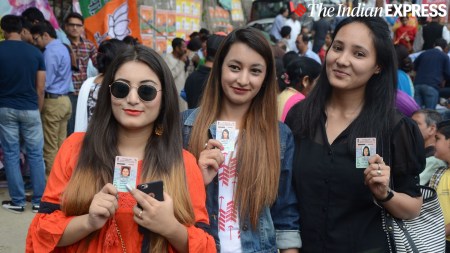
Love at first vote: Gen Z is no longer apolitical

A life skill that a tiger mom teaches her cubs Subscriber Only
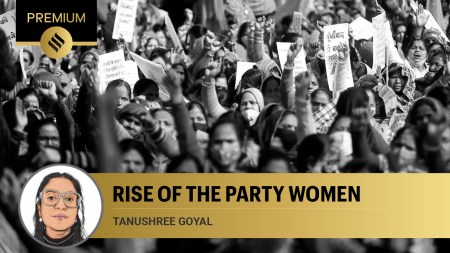
How women party workers are reshaping Indian politics Subscriber Only
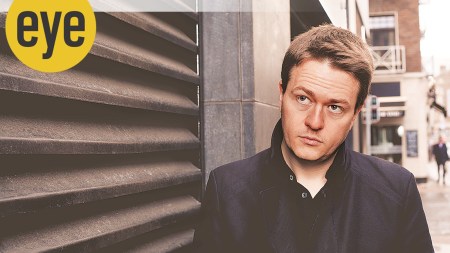
'India has a tradition of eating fresh foods': Author Johann Subscriber Only

Payal Kapadia won the Grand Prix. Now what?

Mr and Mrs Mahi struggles as it tries to please

Gen Z's handbook for investing with Ankur Warikoo

Books to read: How Hindutva hurts women Subscriber Only
- Express Explained
- Express Premium
- Narendra Modi
- Swami Vivekananda

The exit poll results for the 2024 Lok Sabha elections will be released on June 1, giving an indication of how India voted. The counting of votes and result declaration will take place on June 4. The BJP-led NDA and the opposition's INDIA bloc had a tough fight, while West Bengal saw violence and voting in all seven phases. Delhi CM Arvind Kejriwal was released on bail to campaign for his party.

More Explained

Best of Express
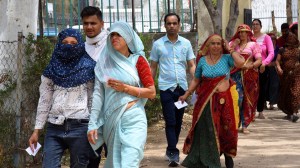
EXPRESS OPINION

May 31: Latest News
- 01 Delhi fire dept got over 200 calls on May 29, highest so far this year
- 02 Pune: Road closures and traffic diversions in place due to ongoing construction on Ganeshkhind road
- 03 Bharti Airtel names Sharat Sinha Airtel Business CEO
- 04 NATO chief Stoltenberg seeks €40 billion per year for Ukraine military aid: Sources
- 05 Two Delhi artists lead a community art exhibit to highlight air pollution
- Elections 2024
- Political Pulse
- Entertainment
- Movie Review
- Newsletters
- Web Stories
TYRE PARTNER

ASSOCIATE PARTNER

Why PM Modi Chose Kanniyakumari's Vivekananda Rock To Meditate After End Of 2024 Poll Campaign
Curated By : News Desk
Edited By: Shilpy Bisht
Last Updated: May 30, 2024, 11:36 IST
New Delhi, India

PM Narendra Modi’s Kanniyakumari sojourn comes ahead of the 2024 Lok Sabha Election results on June 4. In 2019, he undertook a 15-hour 'ekantavaas’ in Kedarnath. (File Photo: PTI)
PM Modi considers Swami Vivekananda as his role model, and was even a member of the Ramakrishna Mission, a spiritual and philanthropic organisation founded by Swami Vivekananda. Modi’s choice to meditate in Kanniyakumari in Tamil Nadu also underscores his party’s South India push during this year’s election campaign
Swami Vivekananda, the philosopher, author and a spiritual leader, swam from the shores of Kanniyakumari (Kanyakumari) to an islet in 1892 and meditated there for three days, and attained enlightenment. Prime Minister Narendra Modi has also chosen the same rock, now called the Vivekananda Rock Memorial, to meditate from May 30 to June 1 to mark the end of BJP’s Lok Sabha election campaign.
During the end of the 2019 election campaign, PM Modi visited Kedarnath shrine in Uttarakhand for two days where he undertook a 15-hour ‘ ekantavaas ’ (solitary meditation).
In 2014, PM Modi visited Pratapgarh in Maharashtra and paid homage to Chhatrapati Shivaji who won a crucial battle in November 1659 after slaying Afzal Khan, the general of Adil Shahi Sultans of Bijapur. His victory cleared the way for his coronation as the head of the Maratha empire which the Chhatrapati termed Hindavi Swaraj.
Modi’s Kanniyakumari sojourn comes ahead of the 2024 Lok Sabha Election results on June 4.
Let us first understand the historical significance of the Vivekananda Rock.
While meditating on the islet, which is located some 500 metres from Vavathurai beach in Kanniyakumari – the southern most tip of mainland India at the confluence of the Indian Ocean, the Arabian Sea and the Bay of Bengal – Swami Vivekananda had a vision for developed India.
Swami Vivekandana wandered for four years across India, and formulated his philosophy of having faith in one’s divine nature, truth, purity, honesty, perseverance, courage, strength and love.
As he wrote to Swami Ramkrishnananda (not to be confused with his guru, Sri Ramakrishna) in 1894: “At Cape Comorin sitting in Mother Kumari’s temple, sitting on the last bit of Indian rock, I hit upon a plan: We are so many Sannyasins wandering about, and teaching the people metaphysics — it is all madness. Did not our Gurudeva use to say, “An empty stomach is no good for religion?” That those poor people are leading the life of brutes is simply due to ignorance. We have for all ages been sucking their blood and trampling them underfoot” (as quoted in S P Agarwal’s The Social Role of Gita, 1993).
On the eve of Swami Vivekananda’s birth centenary in 1963, the Vivekananda Rock Memorial Committee led by RSS activist Eknath Ranade commemorated the site. The memorial was formally inaugurated by President VV Giri in 1970.
It is believed the Goddess Parvati also meditated on the same rock on one foot as she waited for Lord Shiva.
Today, the rocky islet is accessed through a 15-minute ferry service from Vavathurai. It is also the meeting point of the Indian Ocean, Bay of Bengal and Arabian Sea.
Why Modi Chose Vivekananda Rock
PM Modi considers Vivekananda as his role model, and was even a member of the Ramakrishna Mission, a spiritual and philanthropic organisation founded by Swami Vivekananda.
At the Ramakrishna Mission’s 125th anniversary celebrations last year, Modi had said, “Swami Vivekananda had a grand vision of India, and I am sure he is proudly watching India working to fulfil this vision.”
Modi’s choice to meditate in Kanniyakumari in Tamil Nadu also underscores his party’s extensive South India push during this year’s election campaign. The PM South India’s trips accounted for over a third of his total tours in the last three years, with seven visits made to Tamil Nadu in 2024 alone.
He has been promoting Tamil culture and language during his campaign speeches for the Lok Sabha elections. He also visited several temples, including the Sri Ranganathaswamy Temple, Sri Arulmigu Ramanathaswamy Temple and the Kothandaramaswamy Temple in Tamil Nadu ahead of the April 19 Lok Sabha Election.
The five southern states — Kerala, Tamil Nadu, Andhra Pradesh, Telangana, and Karnataka — account for 131 of 543 Lok Sabha seats. Tamil Nadu alone accounts for 39 seats in Parliament. Prime Minister Modi had said the BJP would emerge as the single-largest party in the South. On May 20, he said in an interview to PTI news agency: “We have already seen a jump in mind-share already, we will see a big jump in seat share and vote share for us in the region.”
What’s the Preparation for Modi’s Visit?
Around 2,000 policemen and security agencies have been deployed to ensure that the PM’s 45-hour stay at the Vivekananda Rock Memorial on Thursday is smooth.
Tirunelveli ranges DIG Pravesh Kumar, accompanied by the superintendent of police E Sundaravathanam, inspected the security arrangements at the rock memorial, boat jetty, helipad, and state guest house here, PTI reported.
The PM will reach Thiruvananthapuram airport on Thursday afternoon after winding up his election campaign at Hoshiarpur in Punjab. He will reach the state guest house in Kanniyakumari in the evening and leave for Vivekananda Rock Memorial by boat. He will remain there until Saturday afternoon.
Modi will reach Kanniyakumari helipad by Saturday evening and return to Thiruvananthapuram before flying back to Delhi the same day.
The ruling DMK in Tamil Nadu has submitted a petition to the district collector, opposing permission for the Prime Minister’s spiritual visit. They cited the election model code of conduct currently in effect and the ongoing tourism season, which is expected to attract a significant number of domestic and international tourists.
- Kanyakumari
- lok sabha election results
- News18 Explains
- vivekananda rock memorial
- You Are At:
Tamil Nadu Congress to approach EC over PM Modi's meditation event at Vivekananda Rock Memorial
The rock, where the prime minister will meditate, had a major impact on vivekananda's life and holds a similar significance in the monk's life as sarnath for gautam buddha..

He will meditate from the evening of May 30 to the evening of June 1 at Dhyan Mandapam, the place where Vivekananda — a spiritual icon admired by Modi — is believed to have had a divine vision about 'Bharat Mata', they said. The prime minister had gone on a similar meditation exercise in a Kedarnath cave after the 2019 poll campaign.
Party functionaries said Modi's decision to pick the spot in Kanyakumari for his spiritual sojourn underscores his commitment to bringing to fruition Vivekananda's vision for the country.
He has been sounding confident about returning to power for a third term after the votes are counted on June 4. The last phase of polling is scheduled for June 1. Campaigning for polls ends two days before elections.
Read all the Breaking News Live on indiatvnews.com and Get Latest English News & Updates from Tamil Nadu

Lok Sabha Secretariat gears up to welcome newly elected MPs with paperless registration process

Kota Factory Season 3: Jitendra Kumar aka Jeetu to return on Netflix on THIS date

Virat Kohli joins Indian camp in New York; doubtful for warm-up game against Bangladesh
Related Tamil-nadu News

PM Modi begins two-day long meditation at Vivekananda Rock Memorial in Kanyakumari

PM Modi's two-day-long meditation at Vivekananda Rock: A look at Prime Minister's security cover

Saffron-clad photo of Thiruvalluvar sparks row in Tamil Nadu: Who was he and what was controversy?

Tamil Nadu: Four dead, over 15 injured after bus collides with lorry on Chennai-Trichy Highway

Tamil Nadu to release draft of State Education Policy after lifting of Model Code of Conduct
Latest News

IND vs BAN pitch report, T20 World Cup 2024: How will surface in New York play for warm-up match?

3 dead as fire breaks out at paint factory in Tamil Nadu's Thiruvallur

'Impossible to have Virat at No.3': Ex-Indian star suggests change in Kohli's position for T20 WC
- Aap Ki Adalat
- Aaj Ki Baat
- Kurukshetra
- Haqiqat Kya Hai
- Entertainment

Major Radhika Sen receives UN Military Gender Advocate of the year award

England to play Pakistan in T20I series finale | 31st May | Sports Wrap

Ananya Panday shares postcards from Ambanis' Italian cruise pitstops |31st May | E Wrap

MEA on cancelling JD(S) MP Prajwal Revanna's diplomatic passport, says we had initiated action

Trump Conviction: Manhattan District Attorney praises jury, prosecution team after Trump verdict
- Maharashtra
- Uttar Pradesh
- Madhya Pradesh
- West Bengal
- Jammu & Kashmir
- Chhattisgarh

Air India gets DGCA notice over 20-hour flight delay, fliers' discomfort

Lok Sabha elections 2024: I-T Department seizes record Rs 1100 crore cash; 182% more than 2019

PM's pics of meditating at Vivekananda Rock Memorial surface, Modi not to eat for 45 hours

Arvind Kejriwal, out on bail, to surrender on June 2, says, 'take care of my family'

Lok Sabha Elections 2024 Phase 7: List of 57 constituencies, states, parties and candidates
- Constituencies
- Key Candidates

IND vs BAN T20 World Cup 2024 Dream11: Best fantasy picks, captain choices for warm-up game

Australia dealt a major blow ahead of T20 World Cup 2024

'Hope I can play another World Cup': Shakib Al Hasan keen on extending his career

Live streaming and broadcast details of India vs Bangladesh T20 World Cup warm-up match

Russia reacts to Trump's conviction, says 'illegal means' used to get rid of political rivals

Knife attacker shot by police after stabbing spree at anti-Islam rally in German city | VIDEO

16 killed, 41 wounded in joint US-British airstrikes targeting Yemen's Houthi rebels

UK: Indian-origin girl, 9, 'fighting for her life' after drive-by shooting in London

Who is Stormy Daniels, at the centre of Donald Trump's hush money conviction?
- Celebrities

Bigg Boss OTT 3: Makers drop first teaser with new host Anil Kapoor, say 'inki awaaz hi kaafi hai'

From Rihanna to Backstreet Boys: International pop stars who graced Ambani weddings

Zeenat Aman reveals reason behind unplanned social media break | Read Post

An epic love story: Ajay Devgn, Tabu starrer Auron Mein Kahan Dum Tha teaser out now | WATCH
- Live Scores
- Other Sports

'Hardik's bowling will be important': RP Singh outlines India's bowling strategy in T20 World Cup

South Africa announce squad for multi-format tour of India, Chloe Tryon, Goodall among absentees

Nishant Dev becomes first Indian male boxer to secure Paris Olympics 2024 quota

YouTube Playables launched: Now play 75 games along with video streaming

Smart ACs: What they are and how they help save electricity?

GPay service to shut down in the US from June 4, to promote Google Wallet

Realme set to launch GT 6 in India, calling it as the ultimate AI Flagship Killer

Jio Financial Services unveils JioFinance App Beta: All you need to know

Donald Trump convicted in historic criminal trial: Can he still run for US president? | EXPLAINED

Why did Supreme Court abolish first EVM-based election in India? What was SC's reasoning | READ

'All Eyes on Rafah': What does it mean and why millions are sharing the viral pic I EXPLAINED

Why is India developing new research station in Antarctica? EXPLAINED

What are AI agents and how do they pose a risk to privacy? | Explained

June 2024 Horoscope: Financial problems for Virgos, know about your zodiac sign

Horoscope Today, May 31: Scorpios may go for a business trip; know about other zodiac signs

Horoscope Today, May 30: Profit in online business for Capricorns; know about other zodiac signs

Horoscope Today, May 29: Libra to get profit in business; know about other zodiac signs

Horoscope Today, May 28: Sudden financial gain for Scorpios; know about other zodiac signs

Delhi airport operator DIAL launches awareness campaign on Wildlife Hazard Management
India's economy grows 7.8 per cent in March quarter, annual growth rate hits 8.2 per cent

RBI transfers 1000 tonnes of gold from UK to its vaults in India

Markets rebound in early trade after five days of decline

'India's Juggernaut': Reliance, Tata named among TIME's 'World's Most Influential Companies'

Smoking in an AC room can be dangerous, know how it can affect your heart, brain and kidney

World No Tobacco Day 2024: Do you want to quit smoking? 5 things to do when you get cravings

World No Tobacco Day : 11 things that happen to your body when you quit smoking cigarettes

Superfood Rosehip: Know THESE 5 benefits of Hipberry

World No Tobacco Day 2024: Date, theme, history, significance and more

IMAGES
VIDEO
COMMENTS
Swami Vivekananda (/ ˈ s w ɑː m i ˌ v ɪ v eɪ ˈ k ɑː n ə n d ə /; Bengali: [ʃami bibekanɔndo] ⓘ; IAST: Svāmī Vivekānanda ; 12 January 1863 - 4 July 1902), born Narendranath Datta (Bengali: [nɔrendronatʰ dɔto]), was an Indian Hindu monk, philosopher, author, religious teacher, and the chief disciple of the Indian mystic Ramakrishna. He was a key figure in the introduction ...
Vivekananda (born January 12, 1863, Calcutta [now Kolkata]—died July 4, 1902, near Calcutta) was a Hindu spiritual leader and reformer in India who attempted to combine Indian spirituality with Western material progress, maintaining that the two supplemented and complemented one another. His Absolute was a person's own higher self; to labour for the benefit of humanity was the noblest ...
Learn about the life, teachings and philosophy of Swami Vivekananda, a Hindu monk and disciple of Ramakrishna Paramhamsa. Explore his achievements, publications, legacy and national youth day in India.
Learn about the life and teachings of Swami Vivekananda, a Hindu monk and disciple of Sri Ramakrishna. He introduced Indian yoga and Vedanta philosophy in the West and advocated for social reform and nationalism in India.
Vivekananda's mission. Born into an aristocratic Bengali Kayastha family of Calcutta, Vivekananda was inclined towards spirituality. He was influenced by his guru, Ramakrishna, from whom he learnt that all living beings were an embodiment of the divine self; therefore, service to God could be rendered by service to humankind.
Guru to the World: The Life and Legacy of Vivekananda. From the Wolfson History Prize-winning author of The Man on Devil's Island, the definitive biography of Vivekananda, the Indian monk who ...
Swami Vivekananda once spoke of himself as a 'condensed India.' His life and teachings are of inestimable value to the West for an understanding of the mind of Asia. William James, the Harvard philosopher, called the Swami the 'paragon of Vedantists.' Max Müller and Paul Deussen, the famous Orientalists of the nineteenth
May 31, 1893, Vivekananda set sail for America from Bombay. The ship sailed via China and Japan, and in July reached Vancouver, from where the Swami travelled to Chicago. Vivekananda gave his first lecture at the Parliament of Religions in Chicago on the inaugural day, September 11, 1893. He was an instant success at the Parliament, given his
The Swami's mission was both national and international. A lover of mankind, he strove to promote peace and human brotherhood on the spiritual foundation of the Vedantic Oneness of existence. A mystic of the highest order, Vivekananda had a direct and intuitive experience of Reality. He derived his ideas from that unfailing source of wisdom and ...
Swami Vivekananda's teachings and philosophy stressed on different aspects of religion, youth, education, faith, character building as well as social issues pertaining to India. Swami Vivekananda was a Hindu monk from India. His teachings and philosophy are a reinterpretation and synthesis of various strands of Hindu thought, most notably ...
A Short Biography. Swami Vivekananda (1863-1902) was the foremost disciple of Sri Ramakrishna and a world spokesperson for Vedanta. His lectures, letters and poems are published as The Complete Works of Swami Vivekananda.Swamiji, as Vivekananda is affectionately known, believed it was best to teach universal principles rather than personalities. . Therefore, his teaching and writing focus on ...
Swami Vivekananda (1863-1902) [1] was an Indian Hindu monk and a key figure in the introduction of Indian philosophies of Vedanta and Yoga to the western world. [2] He was one of the most influential philosophers and social reformers in his contemporary India and the most successful and influential missionaries of Vedanta to the Western world.
Swami Vivekananda's Birth Anniversary is observed on 12 January and is celebrated as National Youth Day. Let us have a look at his teachings, History, philosophies, writings, Life. quotes, biography.
Swami Vivekananda Death. On 4 July 1902, Swami Vivekananda died while in a state of meditation after living his day like any other and teaching his followers and discussing the teachings with Vedic Scholars. Went to his room in the Ramakrishna Math, the monastery he built in honor of his Guru to meditate and breathe his last.
7 Stories from Swami Vivekananda's Life | Master's Words. Sadhguru looks at a few Swami Vivekananda and Ramakrishna Paramahamsa stories that can serve as an inspiration and guiding light to spiritual seekers. 1. Swami Vivekananda And Kali. 2. The Proof Of God. 3.
Swami Vivekananda (1863-1902) is best known in the United States for his groundbreaking speech to the 1893 World's Parliament of Religions in which he introduced Hinduism to America and called for religious tolerance and an end to fanaticism. Born Narendranath Dutta, he was the chief disciple of the 19th-century mystic Ramakrishna and the ...
English. In the list of biographies of Swami Vivekananda published by us, we have one which extensively narrates his life, and also one which presents him very briefly. The present book stands midway between these extremes. ... vivekananda-a-biography Identifier-ark ark:/13960/t9484d90s Ocr tesseract 4.1.1 Ocr_detected_lang ...
The Life Of Swami Vivekananda: His Eastern And Western Disciples is a well-written book with several insightful anecdotes reflecting the teachings of Vivekananda. Vivekananda's inspirational life can set an example for today's youth and his deep, spiritual yet dynamic teachings can influence them positively.
Swami Vivekananda's Early Life. Swami Vivekanand was one of the eight children of Vishwanath Dutta and Bhuvaneshwari Devi and was born in Calcutta as Narendranath Dutta into a wealthy Bengali family. On January 12, 1863, the day of Makar Sankranti, he was born. Father Vishwanath was a prominent member of society and a successful lawyer.
In a nutshell Life Lessons from Swami Vivekananda. Lesson 1: Humility is a precious virtue. Lesson 2: Curiosity is essential in life. Lesson 3: Compassion and kindness are ever golden. Lesson 4: With prayer, we can sail through any storm. Lesson 5: Work for preserving unity.
Swami Vivekananda, the nineteenth-century Indian Hindu monk, is considered one of the most influential people of modern India and Hinduism. Rabindranath Tagore suggested to study Vivekananda's works to learn about India. Indian independence activist Subhas Chandra Bose regarded Vivekananda as his spiritual teacher.
Originally released to PBS streaming, the film takes a 90-minute look at Swami Vivekananda's journey to the U.S., from his famous speech to the 1893 Parliament of the World's Religions to the ...
Born as Narendranath Dutta on 12 th January 1863 in the holy and divine place of Kolkata, Swami Vivekananda was a great Indian saint. He was a figure with "high thinking and simple living". He was a great pious leader, a philosopher, and also a devout personality with great principles. His eminent philosophical works comprise of "Modern ...
The timeless appeal of the speech in Chicago would catapult Swami Vivekananda as one of the most famous Indians, and go on to raise the profile of Hinduism to that of a world religion. SWAMI VIVEKANANDA AND KANNIYAKUMARI'S ROCK MEMORIAL. The Vivekananda Rock Memorial in Kanniyakumari is located on a rock in the sea, about 500 metres from the ...
On the eve of Swami Vivekananda's birth centenary in 1963, the Vivekananda Rock Memorial Committee led by RSS activist Eknath Ranade made efforts to commemorate the site of his enlightenment. The memorial on the rock was formally inaugurated by the President V V Giri in 1970. Behind the prime minister's decision
PM Modi considers Swami Vivekananda as his role model, and was even a member of the Ramakrishna Mission, a spiritual and philanthropic organisation founded by Swami Vivekananda. Modi's choice to meditate in Kanniyakumari in Tamil Nadu also underscores his party's South India push during this year's election campaign. Follow us:
Academics associated with the Ramakrishna Mission — founded by Swami Vivekananda in 1897 — are divided over Prime Minister Narendra Modi sitting for meditation, like the monk, at Kanyakumari ...
Publisher. Atlantic Publishers & Dist, New Delhi. ISBN. 978-81-7156-291-6. OCLC. 463616534. Life and Philosophy of Swami Vivekananda (1989) [1] is an English book written by G. S Banhatti. This is a biography of Swami Vivekananda. The books were published by Atlantic Publishers & Dist, New Delhi.
Lok Sabha Election 2024| 'PM Modi's Life Inspired by Swami Vivekananda': CR Kesavan Reacting to PM Modi's 2-day visit at Vivekananda Rock Memorial, BJP leader CR Kesavan said that life of PM Modi is inspired by Swami Vivekananda "The life and mission of Swami Vivekananda inspired PM Modi.
Prime Minister Narendra Modi is expected to meet meditate at Rock Memorial, a monument built in tribute to Swami Vivekananda, in Kanyakumari following the culmination of the Lok Sabha polls ...